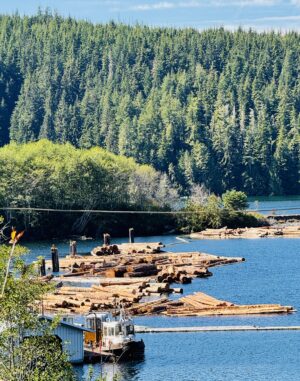 The past few years have been tough for Canada’s forest industry. …In response to US tariffs and as a partial solution to our continuing housing crisis, Prime Minister Carney has made a commendable move, providing support for the lumber industry and setting a target of doubling housing starts. He’s also announced the Canadian Forest Sector Transformation Task Force. Achieving Mr. Carney’s targets for the forestry sector will require transformation of our wood products and construction industries. …When a log is cut up for lumber, about 40% of the tree is converted to residual chips, and without demand for wood chips to make paper, production of lumber will not be viable. New, alternative uses for those residuals become essential. One option would be to replace a number of idled pulp mills with a couple of large, modern mills.
The past few years have been tough for Canada’s forest industry. …In response to US tariffs and as a partial solution to our continuing housing crisis, Prime Minister Carney has made a commendable move, providing support for the lumber industry and setting a target of doubling housing starts. He’s also announced the Canadian Forest Sector Transformation Task Force. Achieving Mr. Carney’s targets for the forestry sector will require transformation of our wood products and construction industries. …When a log is cut up for lumber, about 40% of the tree is converted to residual chips, and without demand for wood chips to make paper, production of lumber will not be viable. New, alternative uses for those residuals become essential. One option would be to replace a number of idled pulp mills with a couple of large, modern mills.
…New pulp mill designs act as biorefineries, making a range of products. Heat can be exported to district heating plants and power to the grid. Methanol, also known as wood alcohol, can be used in various industrial processes. Currently, methanol is made largely from natural gas, so replacing this product with wood-based spirits offers a carbon advantage. Lignin extracted from pulp mills can be used to displace petroleum-based incumbents in a range of products such as plywood glues and polyurethanes. Currently, because of the steep decline in demand for our pulp and paper products, we are only cutting half the wood that provincial forest ministries deem sustainable. This leaves large amounts of biomass in the forests, which can amplify the threat of wildfires. Reinvesting in our forest sector can help us to lower the risk of catastrophic fires going forward. [to access the full story a Globe and Mail subscription is required]
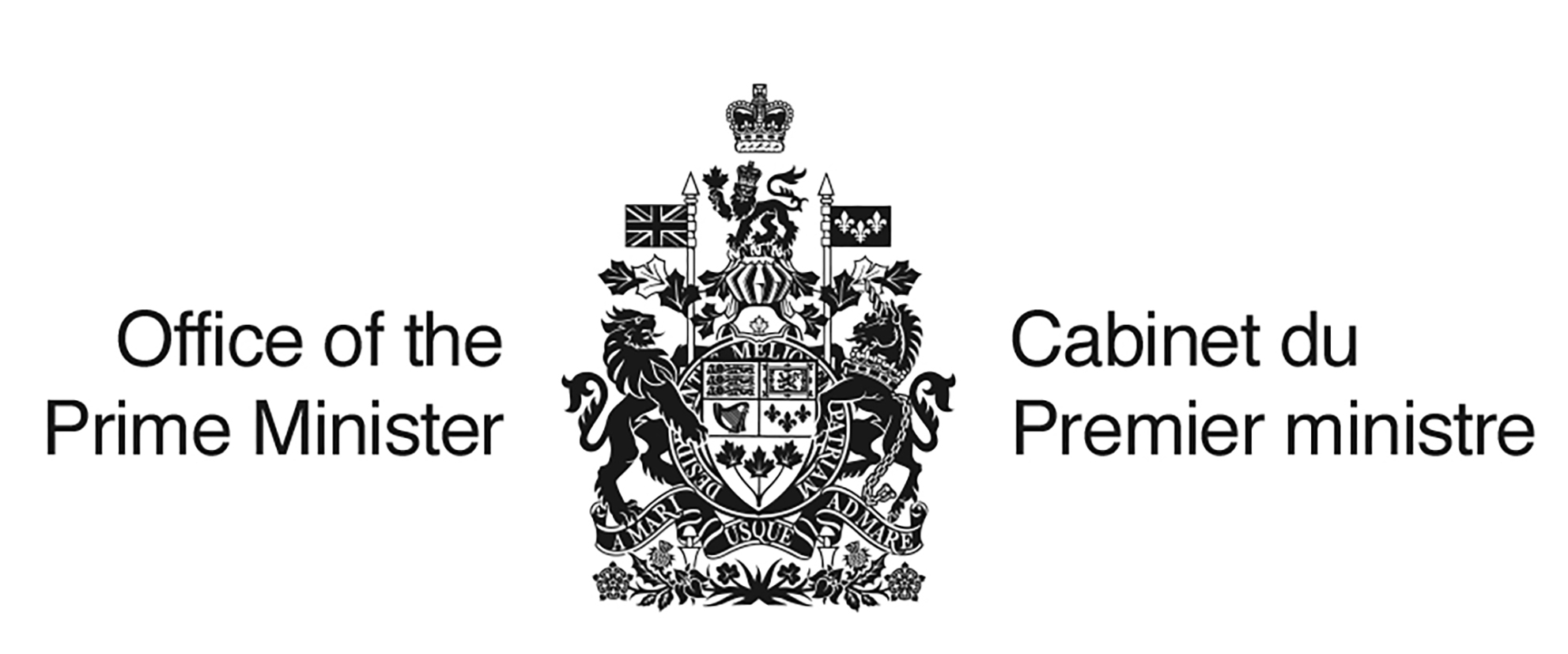 Canada’s government has moved quickly to protect and strengthen the sectors most affected by U.S. tariffs –
Canada’s government has moved quickly to protect and strengthen the sectors most affected by U.S. tariffs – 


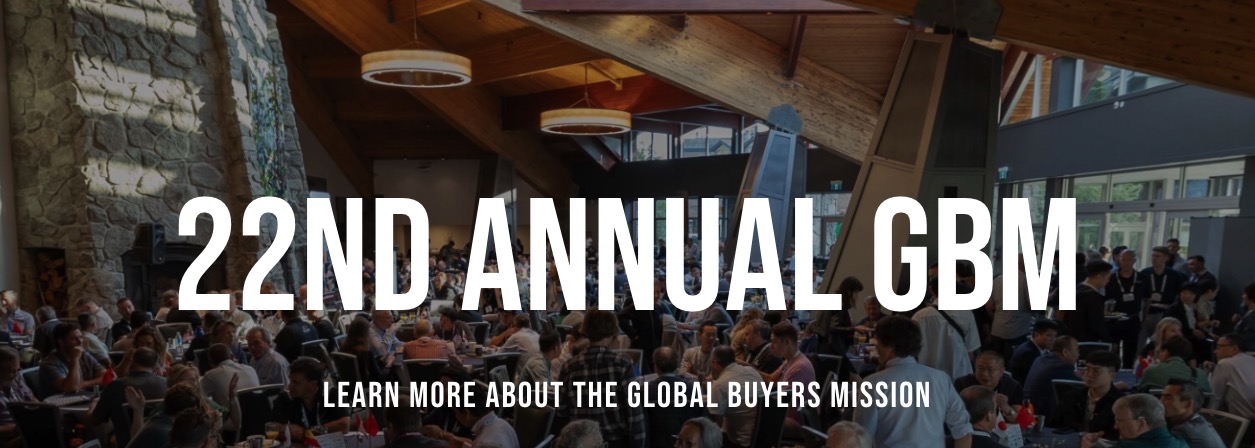 BC Wood is set to welcome delegates and buyers from British Columbia and around the world to the 22nd Annual Global Buyers Mission (GBM), kicking off tomorrow in Whistler, BC. This signature event brings Canadian wood manufacturers together with pre-qualified international buyers in an exclusive, business-focused environment. The GBM opens with a welcome breakfast, where Premier David Eby will address participants and officially launch the trade show. His presence underscores the critical role of BC’s wood and forestry sector in driving innovation, sustainability, and economic growth. Nearly 800 attendees are expected, a testament to the GBM’s significance in connecting Canadian producers with global markets.
BC Wood is set to welcome delegates and buyers from British Columbia and around the world to the 22nd Annual Global Buyers Mission (GBM), kicking off tomorrow in Whistler, BC. This signature event brings Canadian wood manufacturers together with pre-qualified international buyers in an exclusive, business-focused environment. The GBM opens with a welcome breakfast, where Premier David Eby will address participants and officially launch the trade show. His presence underscores the critical role of BC’s wood and forestry sector in driving innovation, sustainability, and economic growth. Nearly 800 attendees are expected, a testament to the GBM’s significance in connecting Canadian producers with global markets.
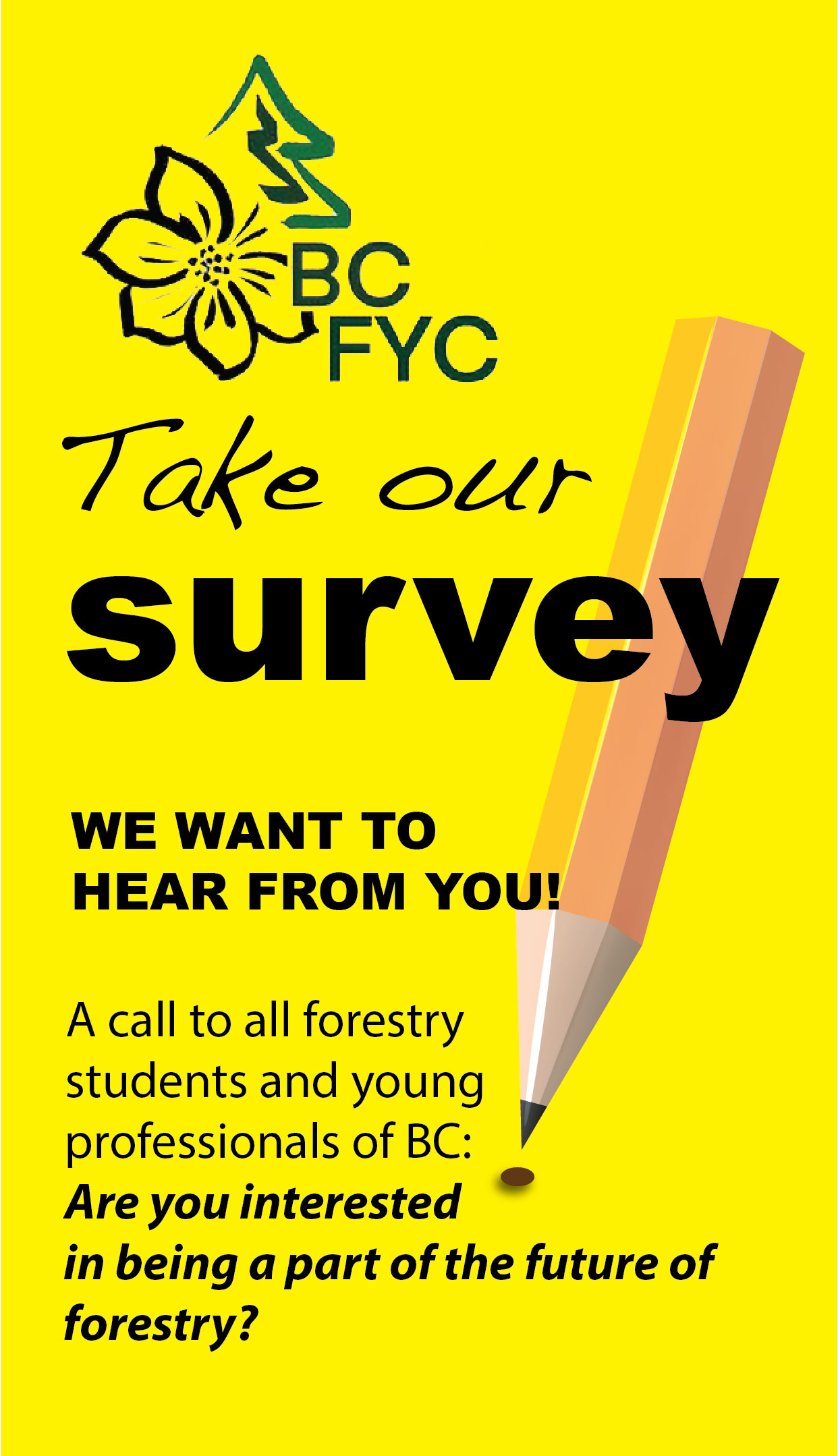 We are gauging interest in a conference for students and young professionals across B.C. in the forestry industry. The goal of this conference is to create a more unified forestry sector throughout the province by bringing together students and young professionals to discuss current and future challenges in forestry, explore innovative solutions, and build relationships that can support us throughout our careers. This is a youth-led initiative and so having your opinions and participation is crucial to determine the topics and speakers for the conference. We have created a short survey (see link) to help determine the topics and timing of this conference. This is a chance for young professionals and students like yourself to build a more connected, informed, and forward-thinking forestry community and empower them to help shape the future of forestry in B.C.
We are gauging interest in a conference for students and young professionals across B.C. in the forestry industry. The goal of this conference is to create a more unified forestry sector throughout the province by bringing together students and young professionals to discuss current and future challenges in forestry, explore innovative solutions, and build relationships that can support us throughout our careers. This is a youth-led initiative and so having your opinions and participation is crucial to determine the topics and speakers for the conference. We have created a short survey (see link) to help determine the topics and timing of this conference. This is a chance for young professionals and students like yourself to build a more connected, informed, and forward-thinking forestry community and empower them to help shape the future of forestry in B.C. 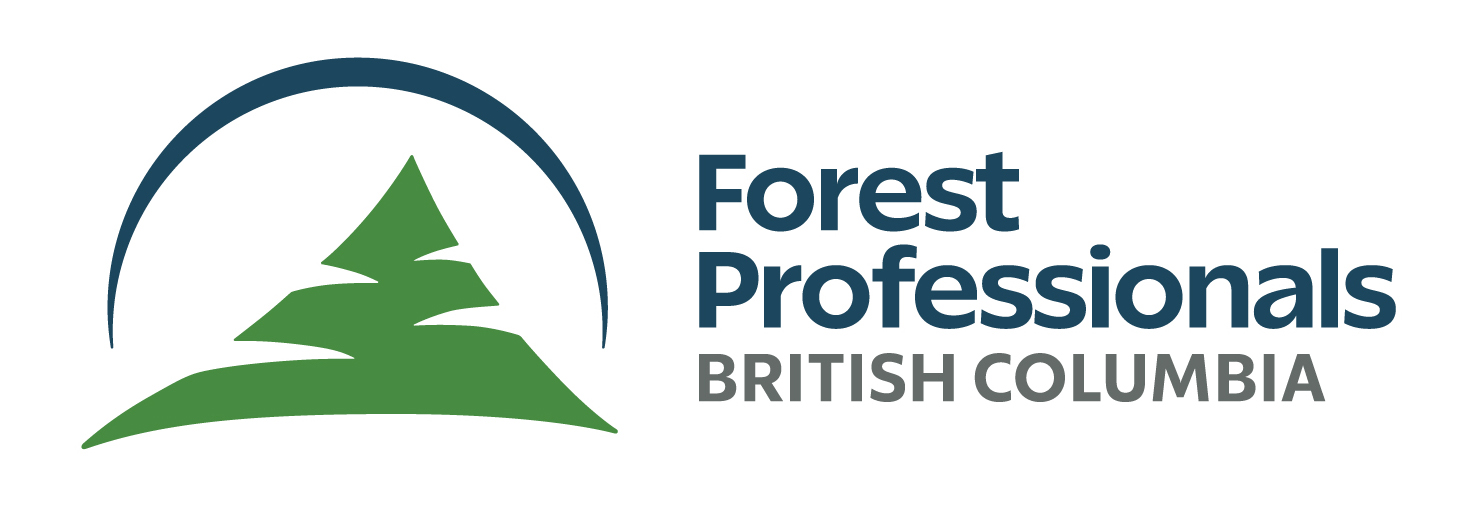 Vancouver — Forest Professionals British Columbia (FPBC) honoured seven individuals as part of its recognition program in Vancouver on February 5. Forest Professionals BC recognized three Distinguished Forest Professionals, one Forest Professional of the Year, one Jim Rodney Memorial Volunteer of the Year, and two authors for BC Forest Professional Magazine Best Article at the 78th Forest Professionals BC forestry conference recognition banquet.
Vancouver — Forest Professionals British Columbia (FPBC) honoured seven individuals as part of its recognition program in Vancouver on February 5. Forest Professionals BC recognized three Distinguished Forest Professionals, one Forest Professional of the Year, one Jim Rodney Memorial Volunteer of the Year, and two authors for BC Forest Professional Magazine Best Article at the 78th Forest Professionals BC forestry conference recognition banquet. 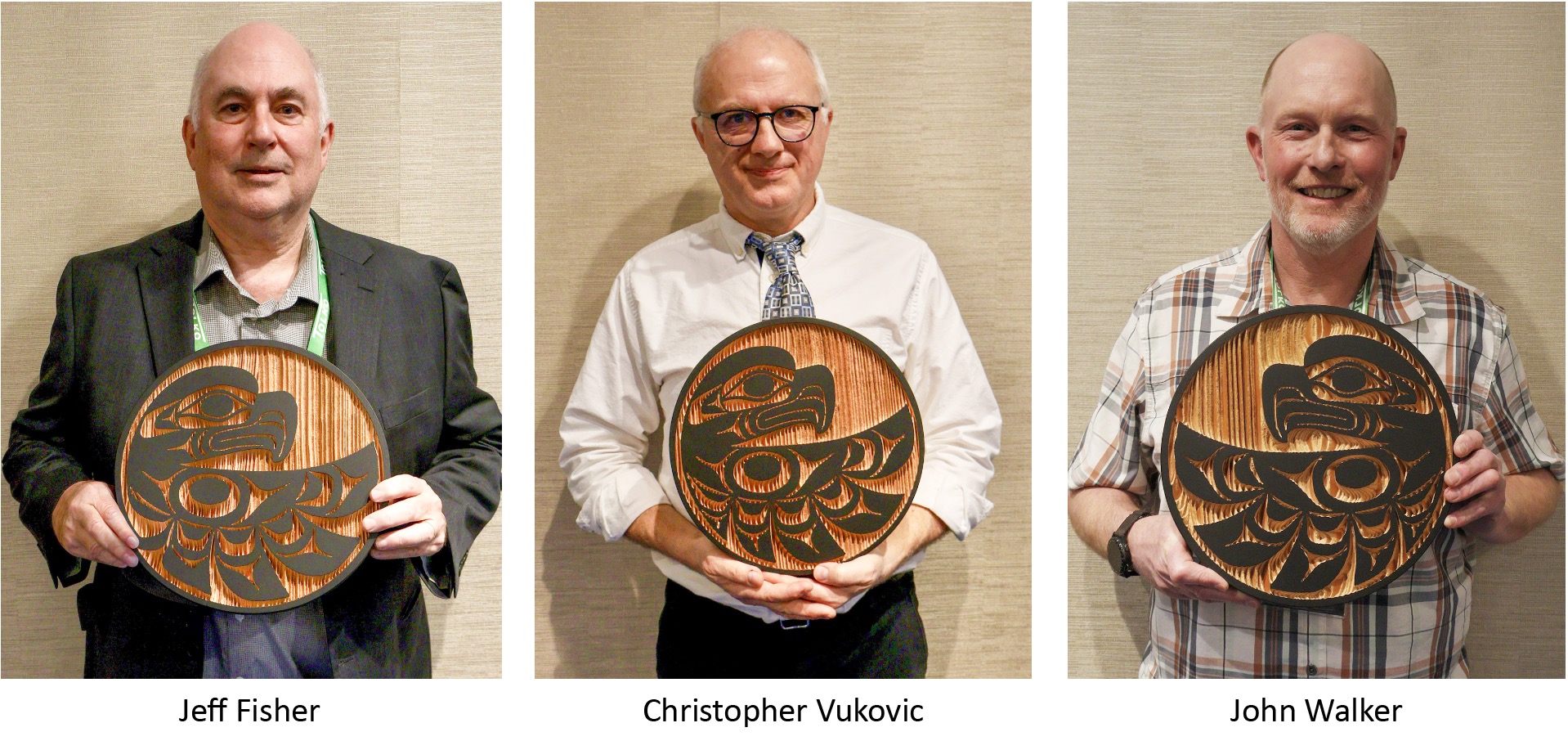 …Jeff Fisher (North Vancouver), BSF, RPF, Christopher Vukovic (Qualicum Beach), HBScF, RPF(Ret), and John Walker (Williams Lake), RPF, were honoured as Distinguished Forest Professionals for 2025. This category recognizes significant accomplishments over a career, for providing outstanding service to the profession of forestry and for furthering the principles of Forest Professionals BC. It is the profession’s highest honour for a registrant.
…Jeff Fisher (North Vancouver), BSF, RPF, Christopher Vukovic (Qualicum Beach), HBScF, RPF(Ret), and John Walker (Williams Lake), RPF, were honoured as Distinguished Forest Professionals for 2025. This category recognizes significant accomplishments over a career, for providing outstanding service to the profession of forestry and for furthering the principles of Forest Professionals BC. It is the profession’s highest honour for a registrant. 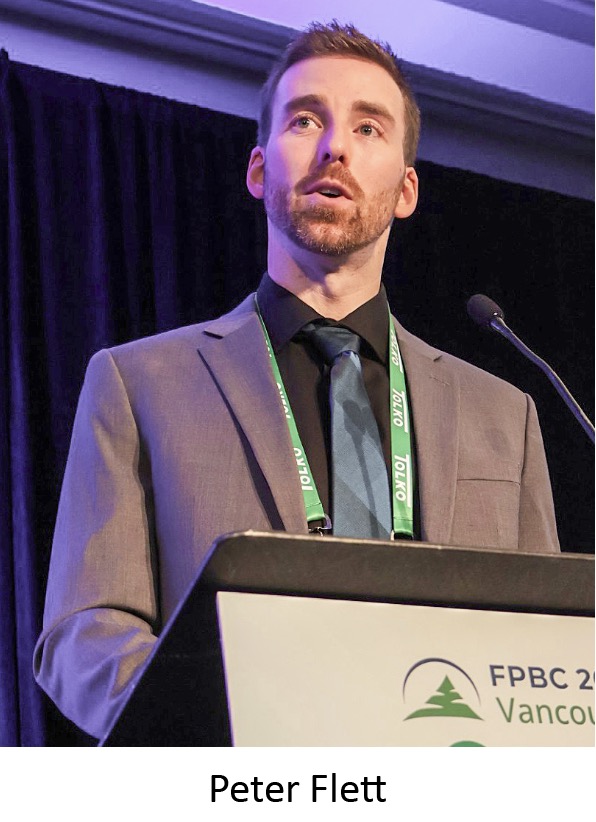
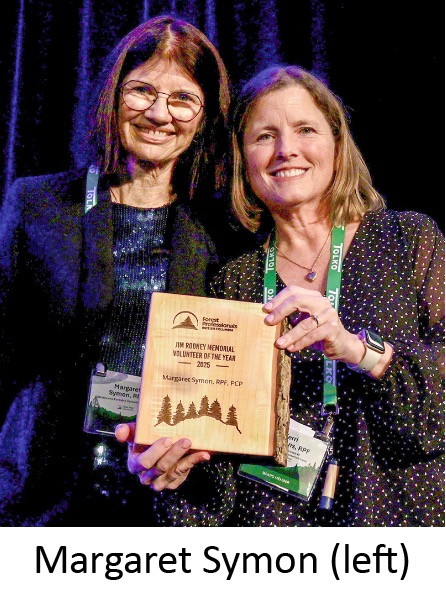 Peter Flett, MSFM, RPF, of Penticton is the 2025 Forest Professional of the Year. Margaret Symon, RPF, PCP, of Duncan is the 2025 Jim Rodney Memorial Volunteer of the Year. Lastly, Vanessa Fetterly, BSc, RPBio, and Carl Pollard, BSc, RPF, collaborated on the 2025 BC Forest Professional Magazine Best Article.
Peter Flett, MSFM, RPF, of Penticton is the 2025 Forest Professional of the Year. Margaret Symon, RPF, PCP, of Duncan is the 2025 Jim Rodney Memorial Volunteer of the Year. Lastly, Vanessa Fetterly, BSc, RPBio, and Carl Pollard, BSc, RPF, collaborated on the 2025 BC Forest Professional Magazine Best Article.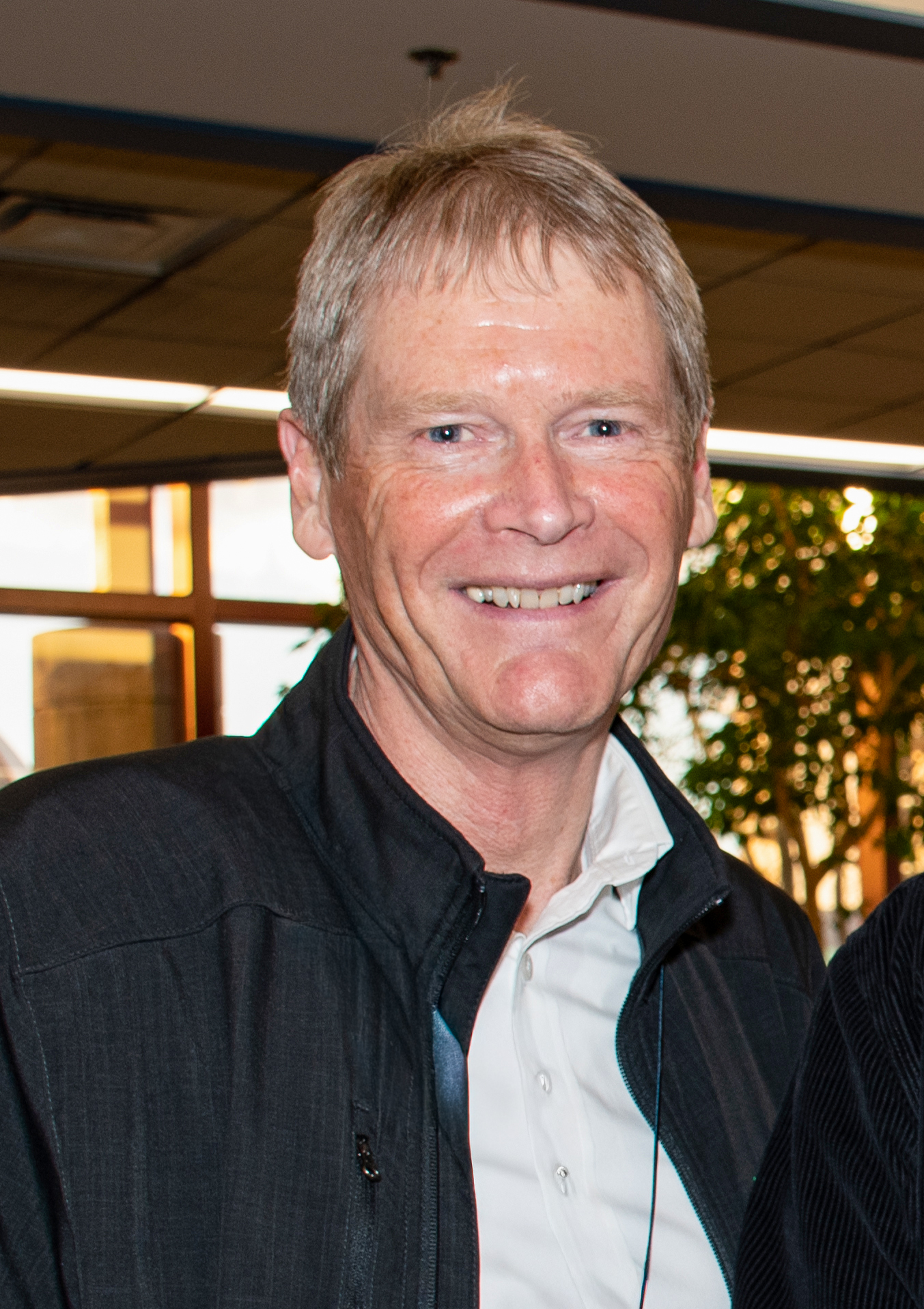 Nick Arkle, BSF’84, and Louise Arkle, BA’82, MA’85
Nick Arkle, BSF’84, and Louise Arkle, BA’82, MA’85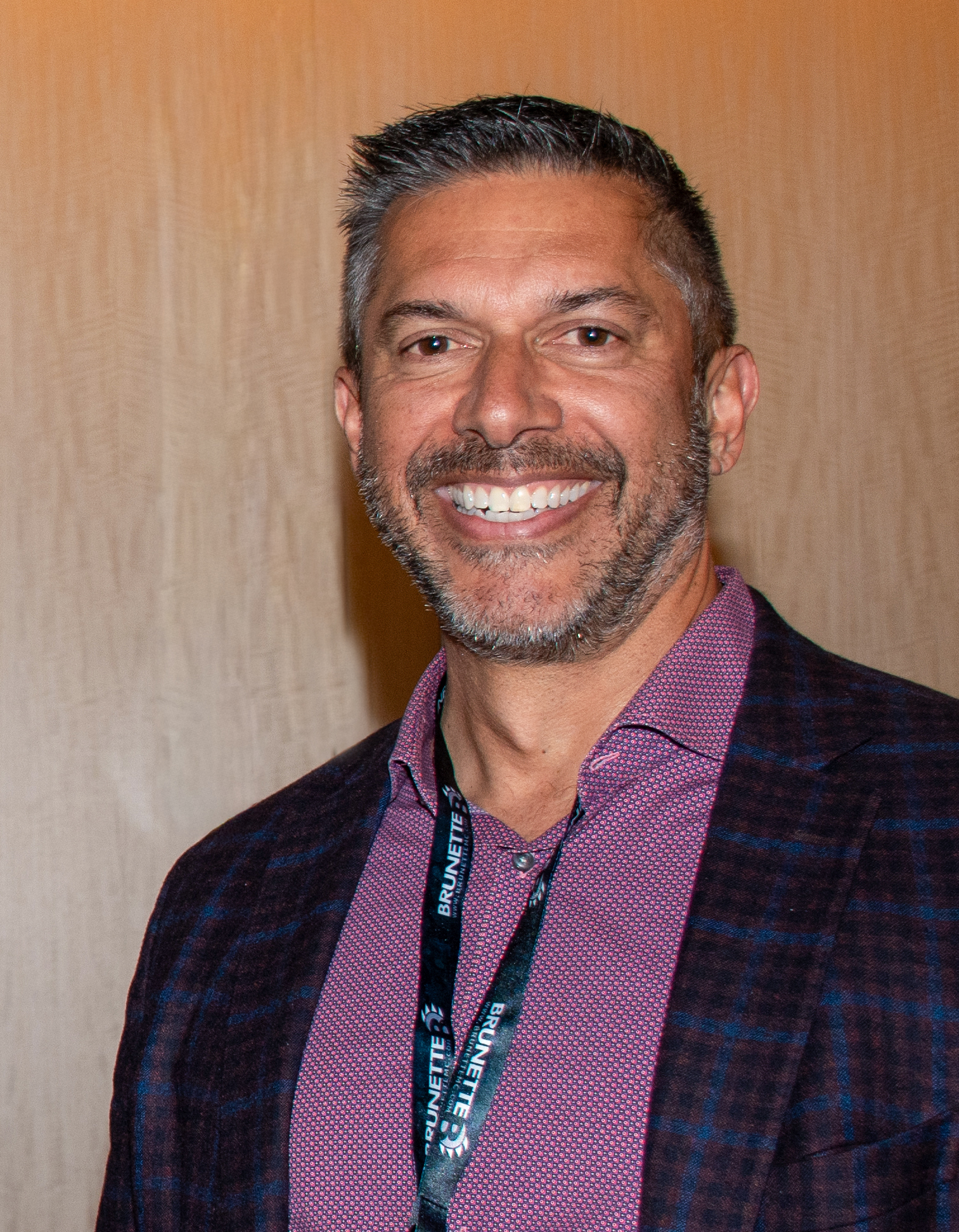 John Mohammed, BSc(ForSci)’91
John Mohammed, BSc(ForSci)’91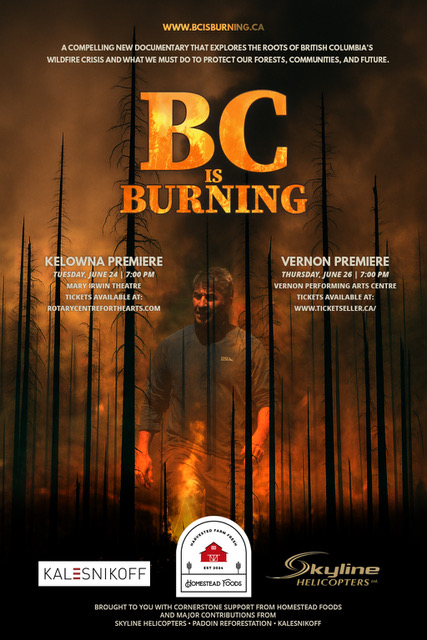 Day Three of the Truck Loggers Association convention opened with a private screening of BC Is Burning, a documentary produced by professional forester Murray Wilson examining British Columbia’s escalating wildfire crisis and the forest conditions shaping fire behaviour. Introduced by moderator Vaughn Palmer as an “urgent, powerful documentary,” the film explores how fuel buildup, insect damage, drought, and decades of fire suppression have contributed to larger, more intense wildfires, while highlighting a range of forest management approaches being applied in BC and elsewhere, including California. The screening was followed by a Q&A moderated by Palmer with Dr. Carolyn Smyth of Natural Resources Canada, Rob Schweitzer of the Ministry of Forests and BC Wildfire Service, and Jim McGrath of Tk’emlúps te Secwépemc, all of whom also appeared in the film. Discussion focused on fuel mitigation, fire salvage, carbon dynamics, and policy and permitting constraints.
Day Three of the Truck Loggers Association convention opened with a private screening of BC Is Burning, a documentary produced by professional forester Murray Wilson examining British Columbia’s escalating wildfire crisis and the forest conditions shaping fire behaviour. Introduced by moderator Vaughn Palmer as an “urgent, powerful documentary,” the film explores how fuel buildup, insect damage, drought, and decades of fire suppression have contributed to larger, more intense wildfires, while highlighting a range of forest management approaches being applied in BC and elsewhere, including California. The screening was followed by a Q&A moderated by Palmer with Dr. Carolyn Smyth of Natural Resources Canada, Rob Schweitzer of the Ministry of Forests and BC Wildfire Service, and Jim McGrath of Tk’emlúps te Secwépemc, all of whom also appeared in the film. Discussion focused on fuel mitigation, fire salvage, carbon dynamics, and policy and permitting constraints.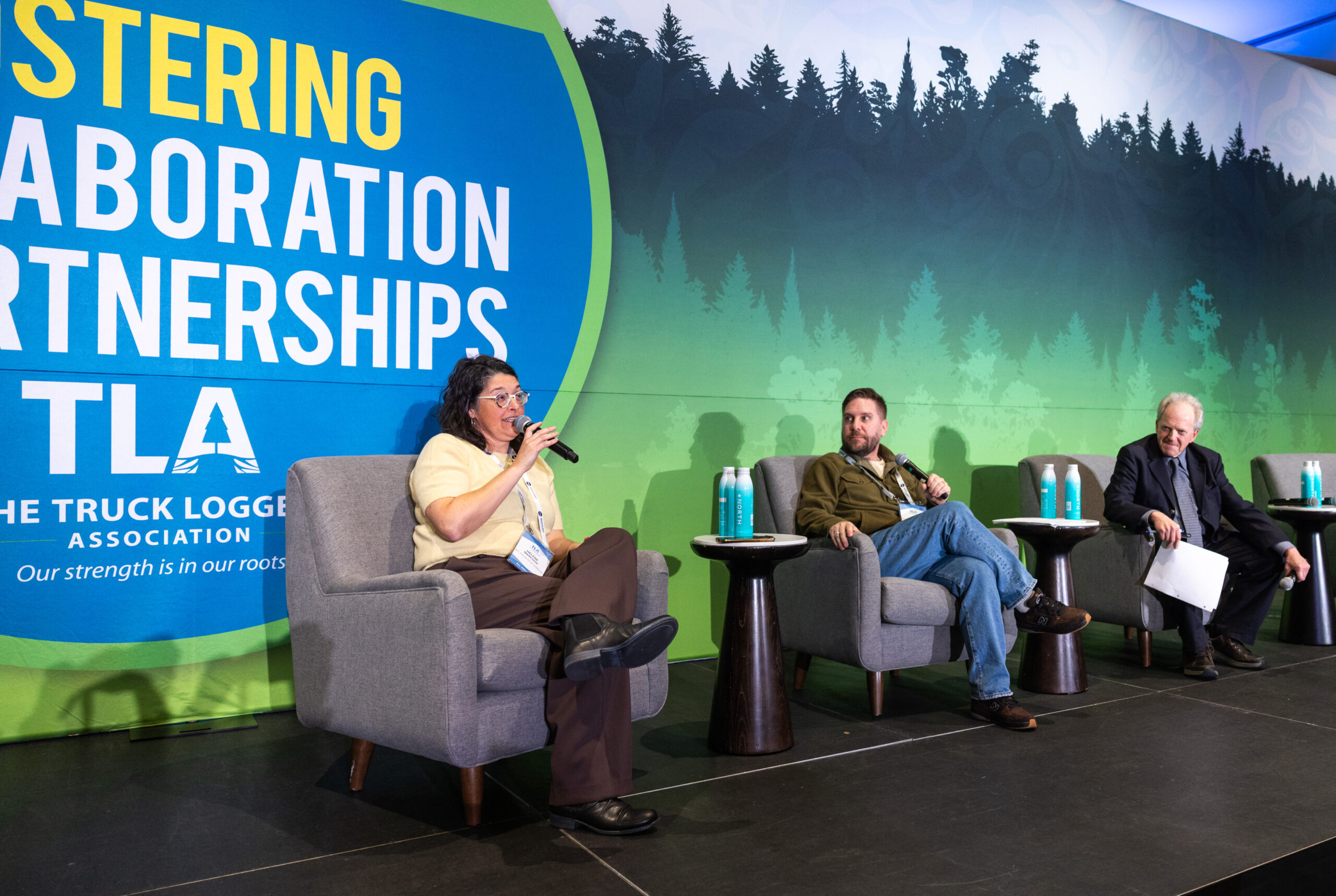 The
The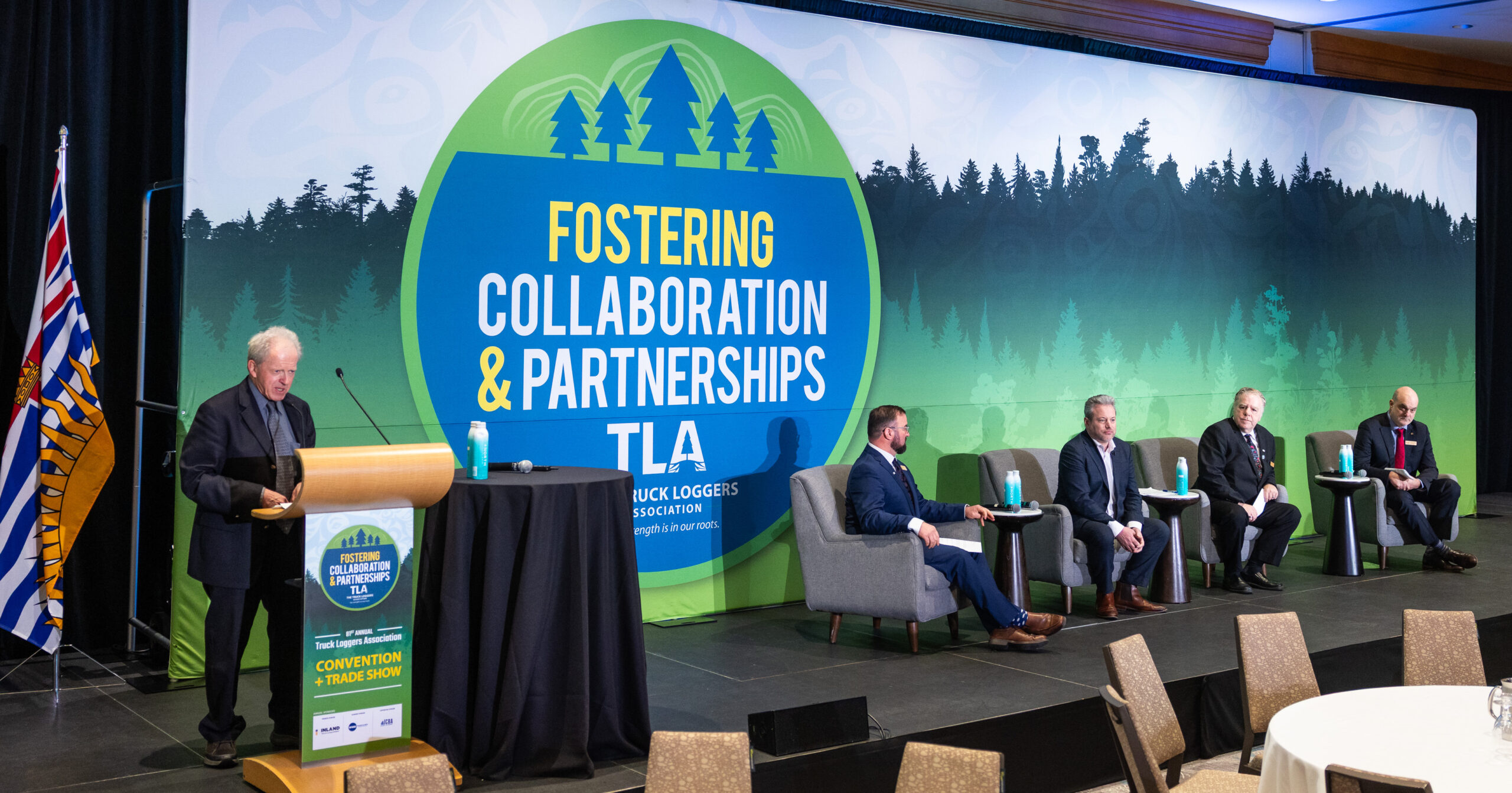 The final session of the Truck Loggers Association convention featured an on-stage conversation with Trevor Halford, Interim Leader of the Conservative Party of BC and current Leader of the Opposition, moderated by Vaughn Palmer. Joined by TLA President Dorian Uzzell, Vice President Bob Marquis, and Past President Aaron Service, the discussion focused on forestry policy, investment certainty, and regulatory conditions affecting contractors and communities. Halford pointed to permitting delays, regulatory complexity, and policy uncertainty as barriers to investment, arguing that businesses are prepared to invest but are being held back by slow approvals. Responding to questions on DRIPA, fibre supply, and the closure of the Crofton mill, Halford framed his party’s call for repeal and his broader critique around the need for clarity, predictability, and timely decision-making. Audience questions reinforced concerns about risk aversion within government and the need for clearer authority and accountability to sustain forestry employment across the province.
The final session of the Truck Loggers Association convention featured an on-stage conversation with Trevor Halford, Interim Leader of the Conservative Party of BC and current Leader of the Opposition, moderated by Vaughn Palmer. Joined by TLA President Dorian Uzzell, Vice President Bob Marquis, and Past President Aaron Service, the discussion focused on forestry policy, investment certainty, and regulatory conditions affecting contractors and communities. Halford pointed to permitting delays, regulatory complexity, and policy uncertainty as barriers to investment, arguing that businesses are prepared to invest but are being held back by slow approvals. Responding to questions on DRIPA, fibre supply, and the closure of the Crofton mill, Halford framed his party’s call for repeal and his broader critique around the need for clarity, predictability, and timely decision-making. Audience questions reinforced concerns about risk aversion within government and the need for clearer authority and accountability to sustain forestry employment across the province.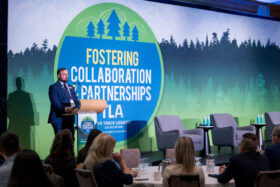
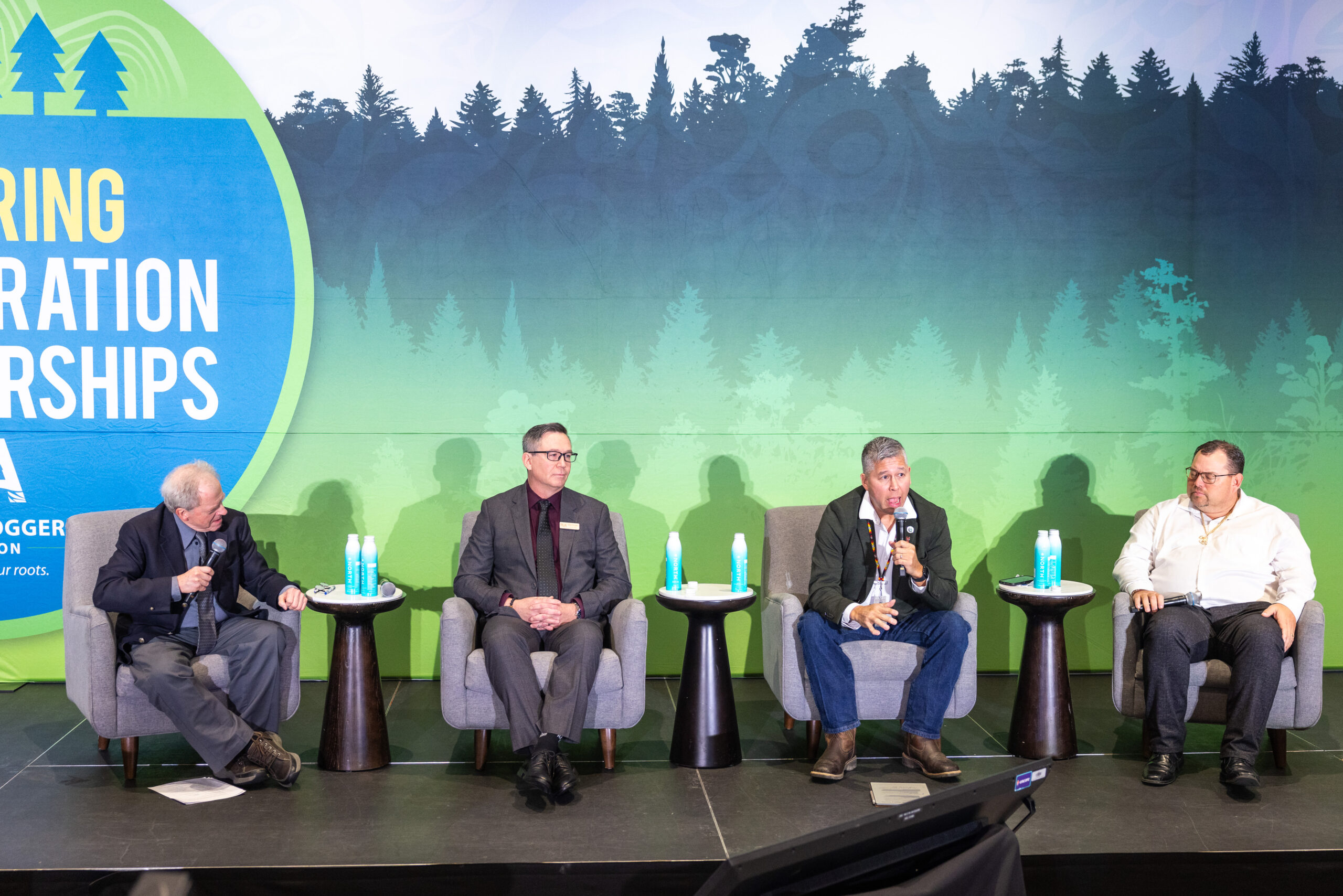 Day 2 of the TLA Convention opened with a panel on First Nations partnerships, examining how collaboration between Indigenous communities and industry is reshaping forestry in BC. Moderated by Vaughn Palmer, the session featured Lennard Joe, CEO of the BC First Nations Forestry Council; Chief Ronnie Chickite of the We Wai Kai Nation; and Klay Tindall, General Manager of Lil’wat Forestry Ventures. Joe outlined the rapid growth of First Nations tenure and investment, emphasizing operational feasibility, workforce capacity, and the need for partnerships grounded in mutual benefit. Chickite described We Wai Kai’s expansion from small licences to controlling nearly 220,000 cubic metres annually, highlighting reinvestment in employment, education, and long-term community stability. Tindall shared how partnerships helped transform Lil’wat Forestry Ventures, supporting capacity building, wildfire risk reduction, and stewardship in sensitive areas. In a discussion touching on DRIPA, the speakers emphasized inclusion, local economic benefit, and the importance of durable, collaborative governance in forestry.
Day 2 of the TLA Convention opened with a panel on First Nations partnerships, examining how collaboration between Indigenous communities and industry is reshaping forestry in BC. Moderated by Vaughn Palmer, the session featured Lennard Joe, CEO of the BC First Nations Forestry Council; Chief Ronnie Chickite of the We Wai Kai Nation; and Klay Tindall, General Manager of Lil’wat Forestry Ventures. Joe outlined the rapid growth of First Nations tenure and investment, emphasizing operational feasibility, workforce capacity, and the need for partnerships grounded in mutual benefit. Chickite described We Wai Kai’s expansion from small licences to controlling nearly 220,000 cubic metres annually, highlighting reinvestment in employment, education, and long-term community stability. Tindall shared how partnerships helped transform Lil’wat Forestry Ventures, supporting capacity building, wildfire risk reduction, and stewardship in sensitive areas. In a discussion touching on DRIPA, the speakers emphasized inclusion, local economic benefit, and the importance of durable, collaborative governance in forestry.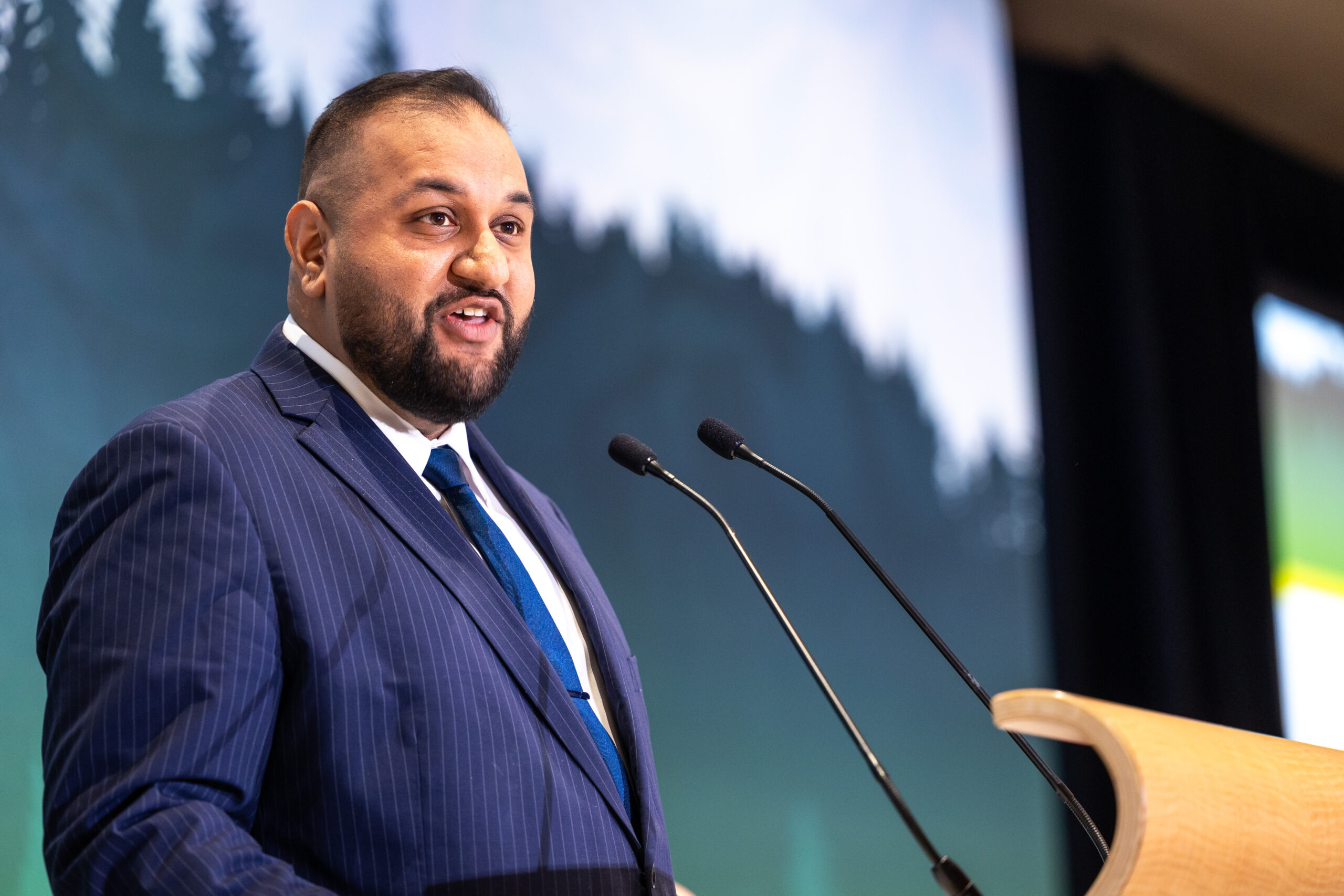 At the TLA Convention’s Leader’s Luncheon, Forests Minister Ravi Parmar outlined the BC government’s current priorities for the forest sector, following a pre-recorded message from Premier David Eby, who is on a trade mission to India. Speaking from abroad, Eby emphasized strengthening international trade relationships and promoting BC products amid global uncertainty. Parmar said forestry is facing a convergence of challenges, including market volatility, high costs, trade pressures, and wildfire risk. Beginning with wildfire, he announced an expansion of the Risk Reduction Equipment Support Trust (REST) program, increasing provincial cost-sharing from 10% to 25% for eligible equipment and modifications used in fuel management and mitigation work. He also addressed fibre supply and Path to 45, stressing the need to remove operational barriers and improve planning certainty, and pointed to ongoing reforms at BC Timber Sales. Parmar emphasized balancing economic viability, environmental responsibility, and reconciliation, while underscoring the importance of international markets for BC’s forest products.
At the TLA Convention’s Leader’s Luncheon, Forests Minister Ravi Parmar outlined the BC government’s current priorities for the forest sector, following a pre-recorded message from Premier David Eby, who is on a trade mission to India. Speaking from abroad, Eby emphasized strengthening international trade relationships and promoting BC products amid global uncertainty. Parmar said forestry is facing a convergence of challenges, including market volatility, high costs, trade pressures, and wildfire risk. Beginning with wildfire, he announced an expansion of the Risk Reduction Equipment Support Trust (REST) program, increasing provincial cost-sharing from 10% to 25% for eligible equipment and modifications used in fuel management and mitigation work. He also addressed fibre supply and Path to 45, stressing the need to remove operational barriers and improve planning certainty, and pointed to ongoing reforms at BC Timber Sales. Parmar emphasized balancing economic viability, environmental responsibility, and reconciliation, while underscoring the importance of international markets for BC’s forest products.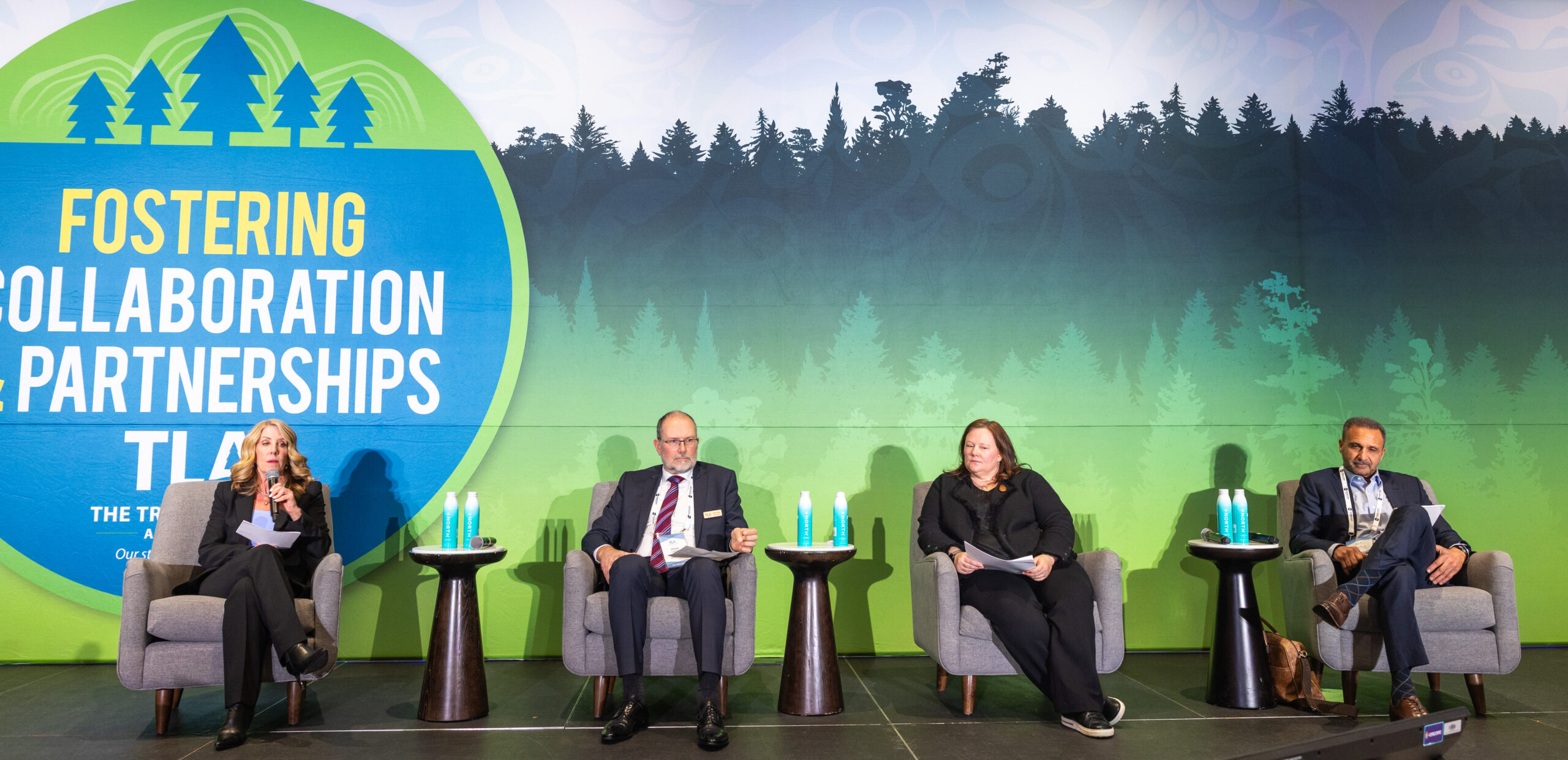 The second “fostering collaboration” panel of Day 2 at the TLA Convention brought together senior leaders from forestry and the broader business community to share organizational perspectives on BC’s economic and forest-sector challenges. Moderated by Vaughn Palmer, the session featured Bridget Anderson, President and CEO of the Greater Vancouver Board of Trade; Peter Lister, Executive Director of the Truck Loggers Association; Kim Haakstad, President and CEO of the BC Council of Forest Industries (COFI); and Joe Nemeth, General Manager of the BC Pulp & Paper Coalition. Anderson addressed the wider provincial economic context, including growth, fiscal pressures, and business conditions. Lister focused on the state of the forest industry, fibre access, costs, and investment certainty. Haakstad examined competitiveness, tenure obligations, employment trends, and economic reconciliation. Nemeth spoke to the pulp and paper sector, highlighting cost structures, fibre availability, and conditions required for future investment.
The second “fostering collaboration” panel of Day 2 at the TLA Convention brought together senior leaders from forestry and the broader business community to share organizational perspectives on BC’s economic and forest-sector challenges. Moderated by Vaughn Palmer, the session featured Bridget Anderson, President and CEO of the Greater Vancouver Board of Trade; Peter Lister, Executive Director of the Truck Loggers Association; Kim Haakstad, President and CEO of the BC Council of Forest Industries (COFI); and Joe Nemeth, General Manager of the BC Pulp & Paper Coalition. Anderson addressed the wider provincial economic context, including growth, fiscal pressures, and business conditions. Lister focused on the state of the forest industry, fibre access, costs, and investment certainty. Haakstad examined competitiveness, tenure obligations, employment trends, and economic reconciliation. Nemeth spoke to the pulp and paper sector, highlighting cost structures, fibre availability, and conditions required for future investment.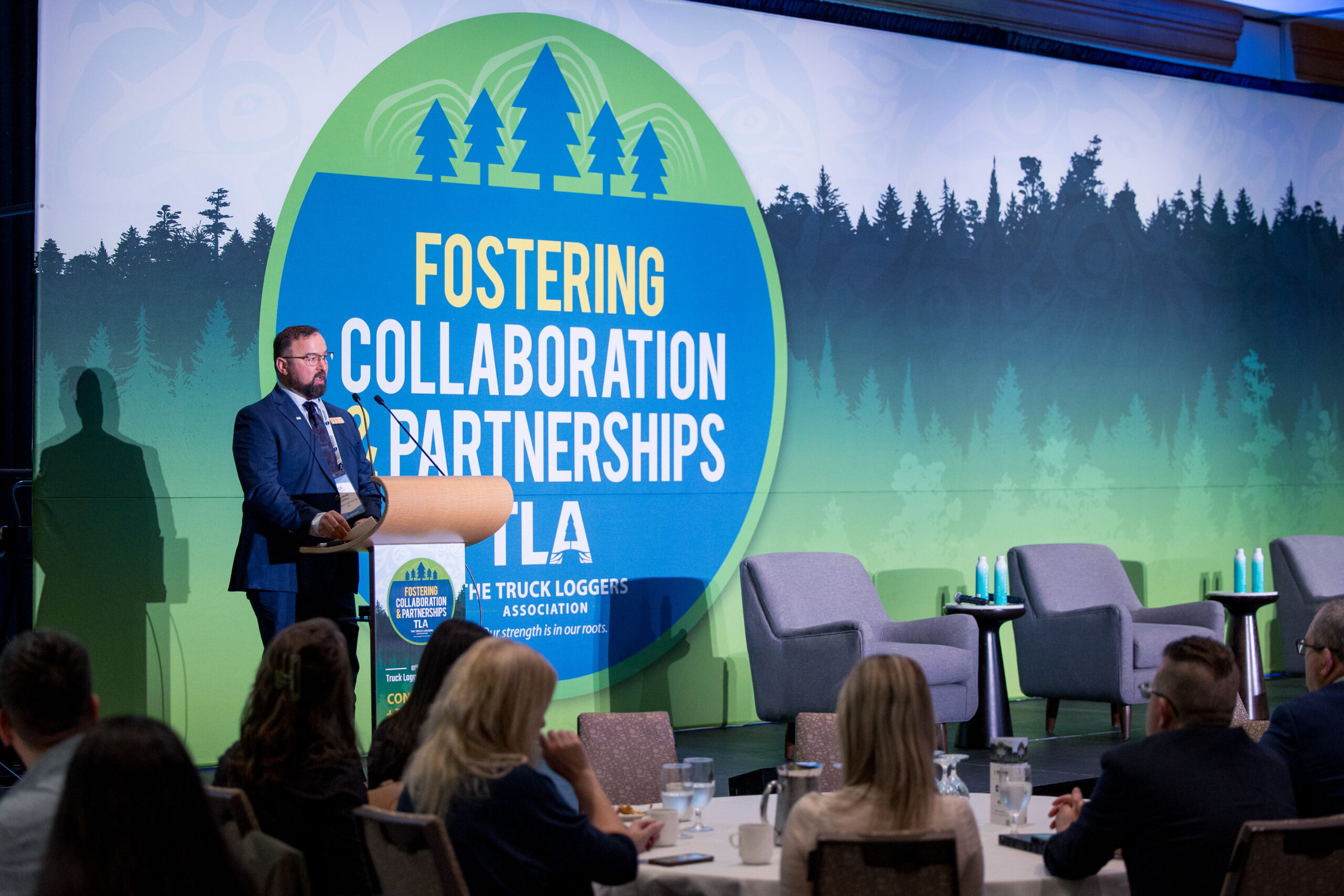
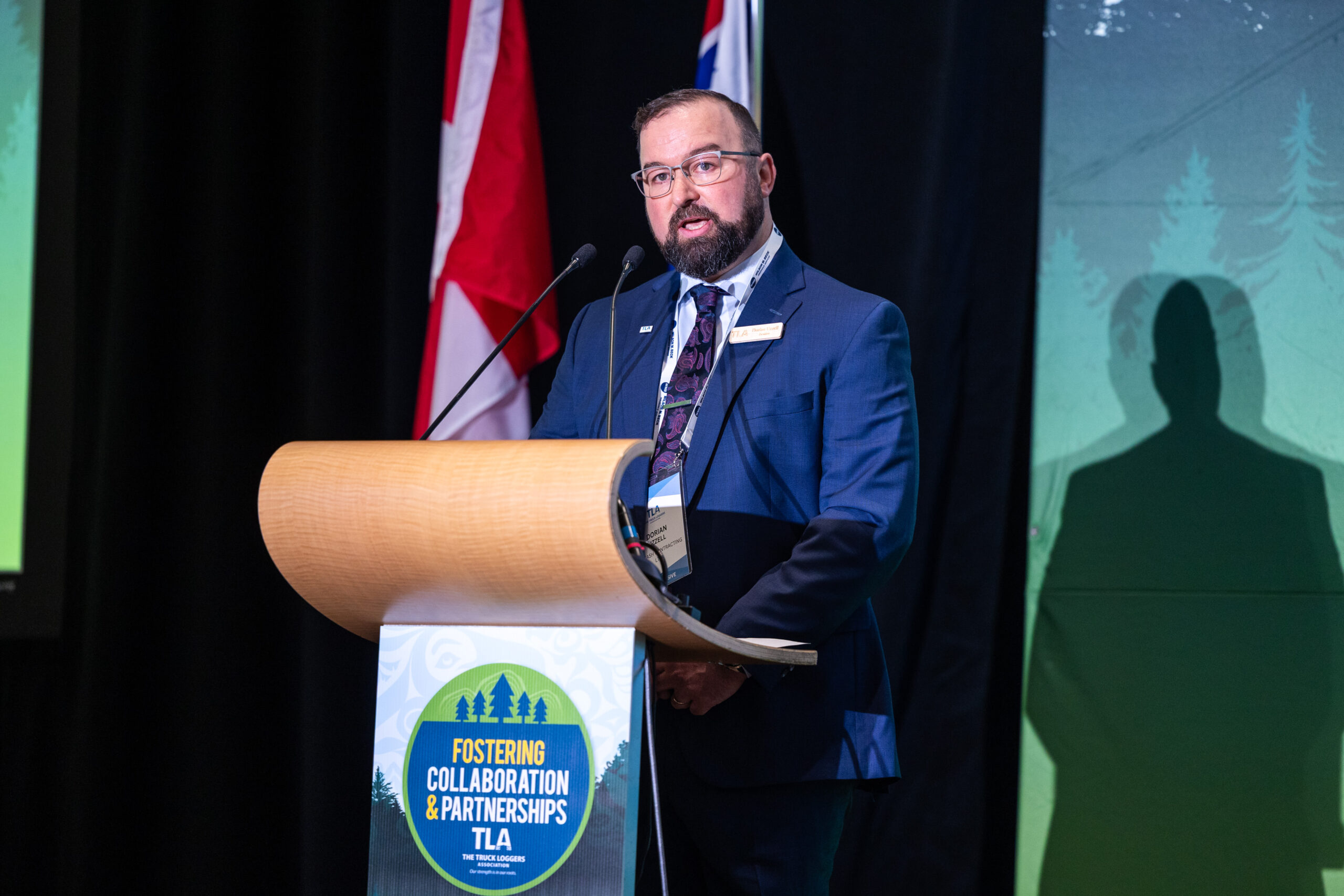
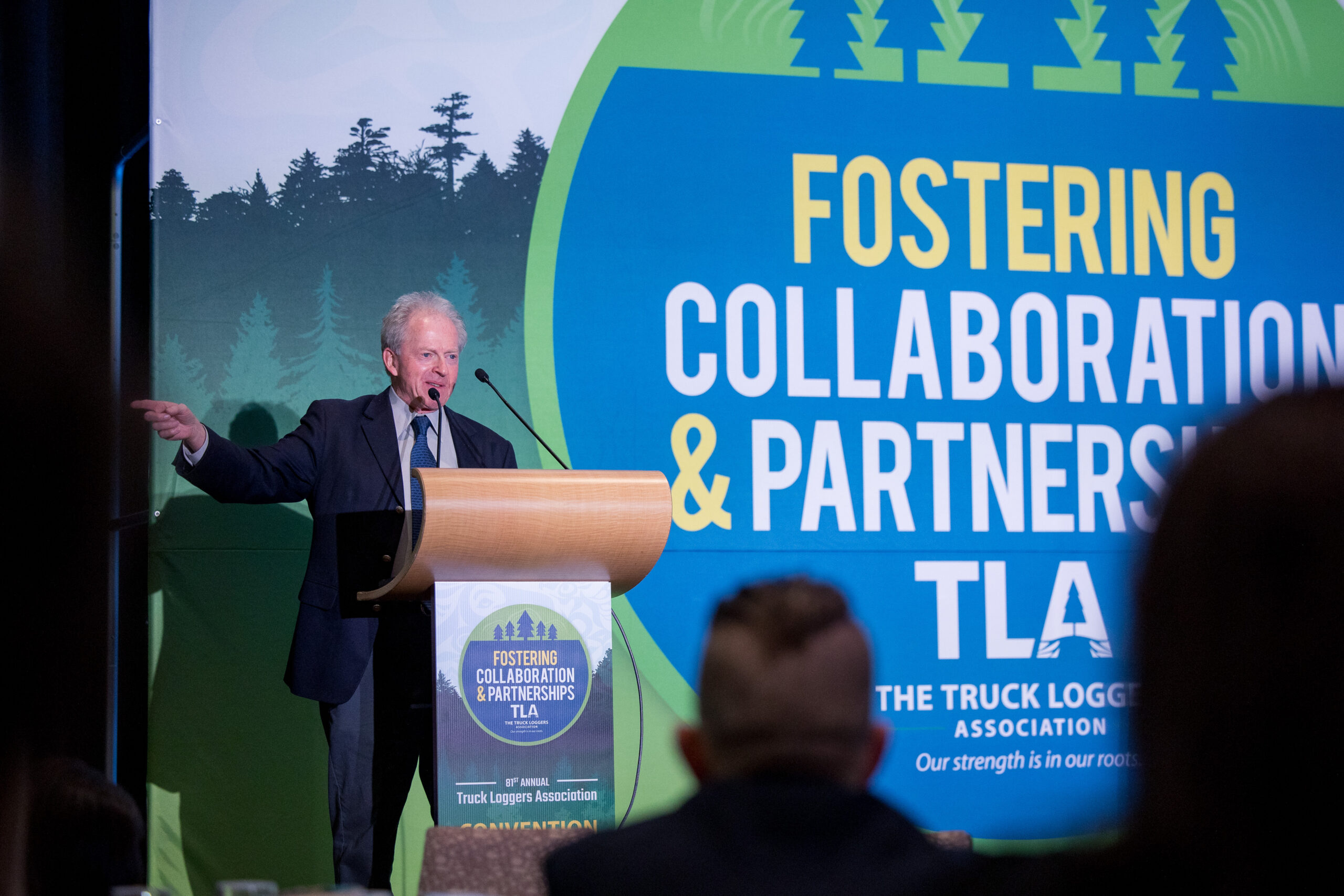
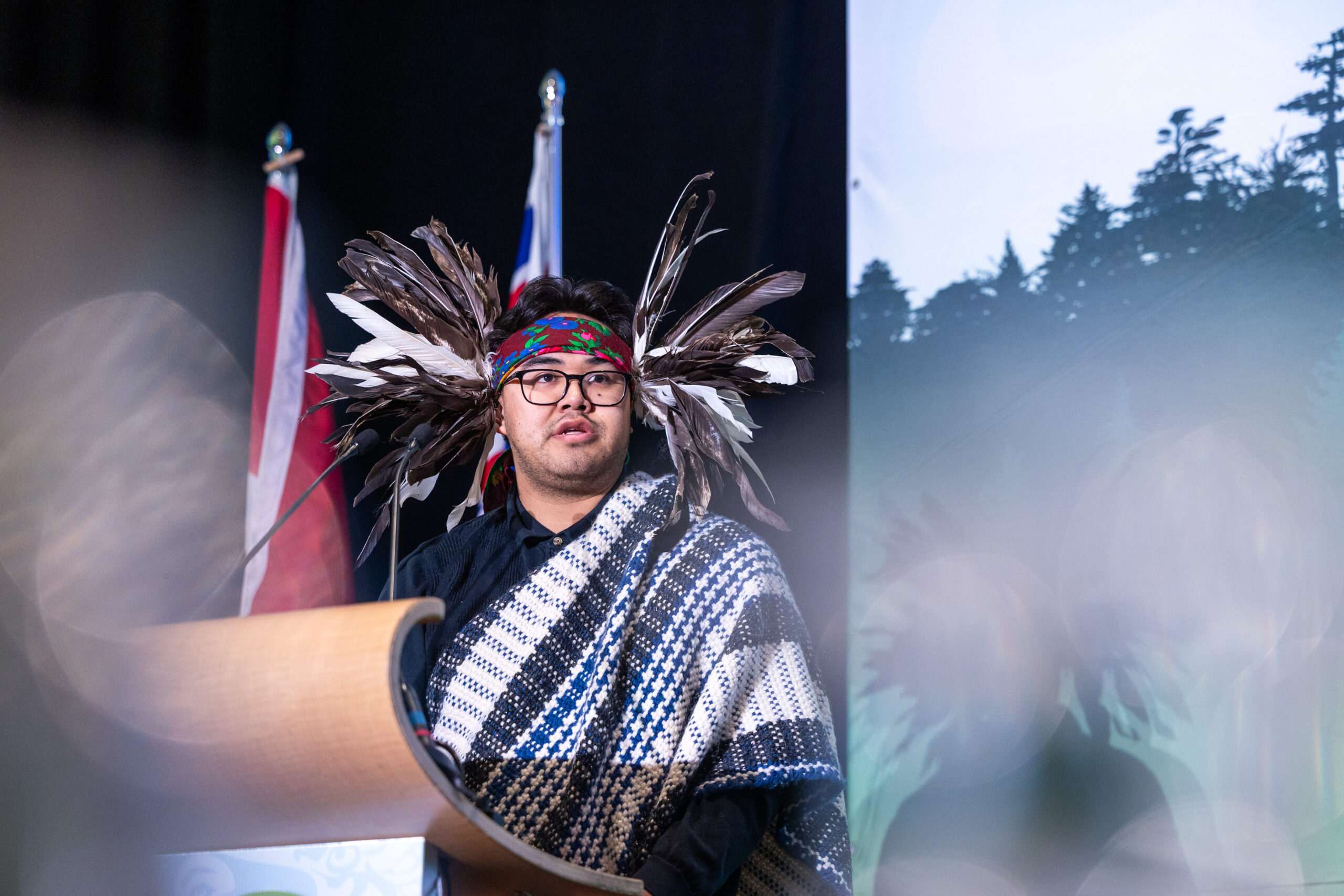
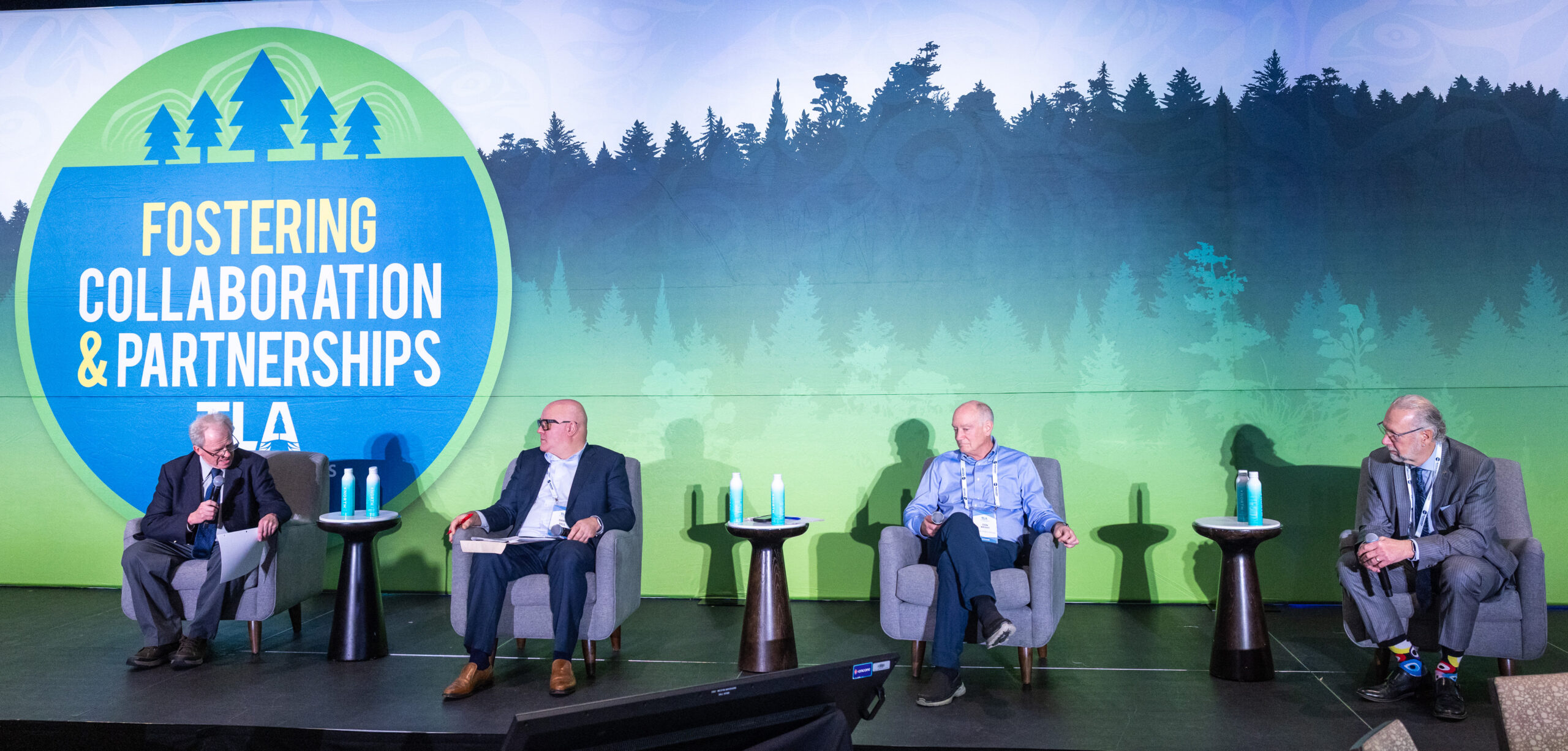 Day 1 of the TLA Conference kicked off its technical program with the Markets & Economy panel, examining how trade disruption, shifting construction trends, and fibre supply constraints are reshaping Canada’s forest sector. Moderated by Vaughn Palmer, the session featured David Fell, Director of Research and Analysis at Forestry Innovation Investment (FII); Rick Jeffery, President and CEO of the Canadian Wood Council; and Don Wright, Senior Counsel at Global Public Affairs. Fell outlined BC’s reliance on export markets, the importance of diversification, and the role of building codes in supporting domestic demand. Jeffery focused on housing, industrialized construction, mass timber, and the need for supply-chain adaptation to capture future growth. Wright addressed the economics of competitiveness, pointing to declining harvest levels, policy-driven fibre constraints, and their implications for government revenue. In the discussion, Wright said restoring an economically sustainable harvest level was “job number one.”
Day 1 of the TLA Conference kicked off its technical program with the Markets & Economy panel, examining how trade disruption, shifting construction trends, and fibre supply constraints are reshaping Canada’s forest sector. Moderated by Vaughn Palmer, the session featured David Fell, Director of Research and Analysis at Forestry Innovation Investment (FII); Rick Jeffery, President and CEO of the Canadian Wood Council; and Don Wright, Senior Counsel at Global Public Affairs. Fell outlined BC’s reliance on export markets, the importance of diversification, and the role of building codes in supporting domestic demand. Jeffery focused on housing, industrialized construction, mass timber, and the need for supply-chain adaptation to capture future growth. Wright addressed the economics of competitiveness, pointing to declining harvest levels, policy-driven fibre constraints, and their implications for government revenue. In the discussion, Wright said restoring an economically sustainable harvest level was “job number one.”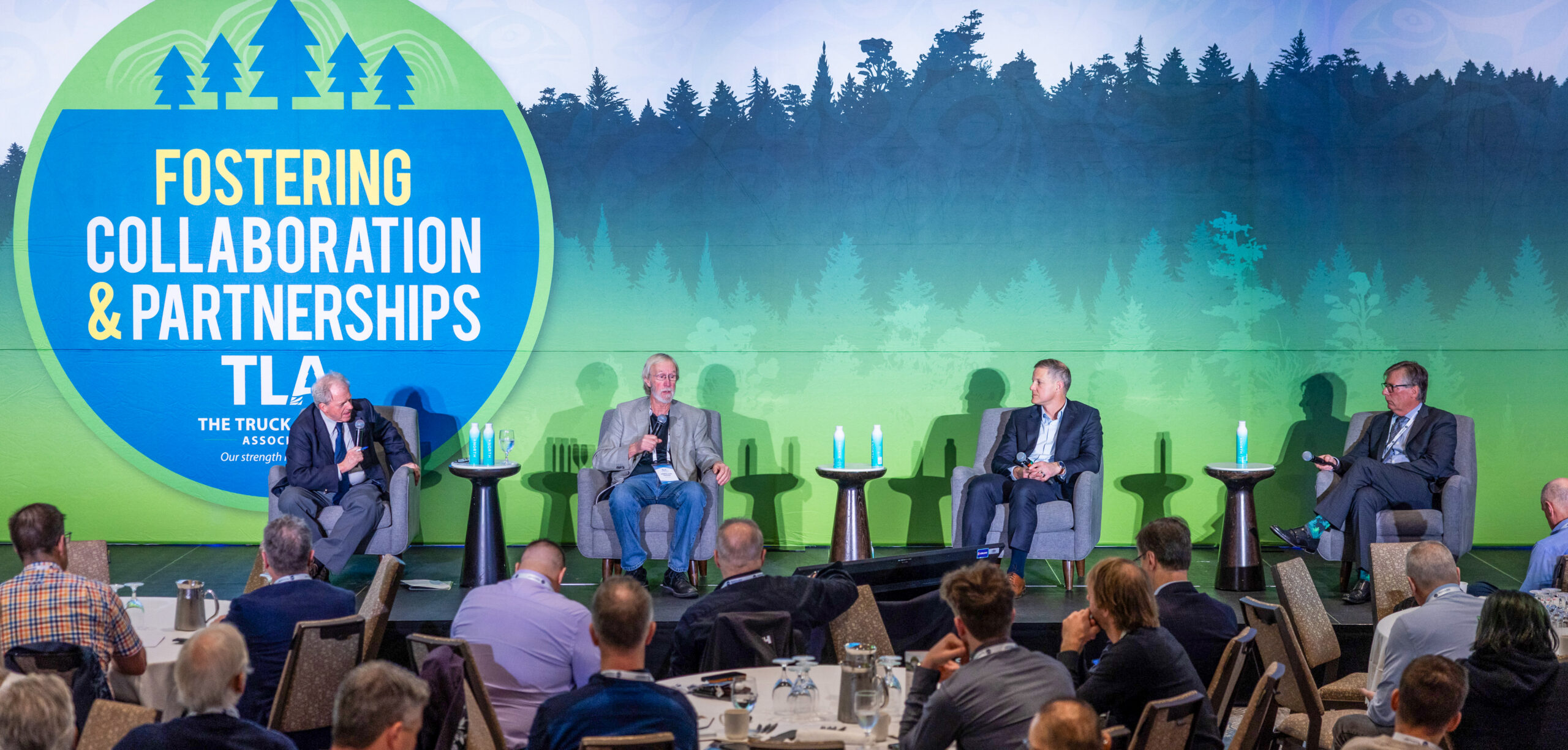 The second session of the TLA Conference featured the Closing the Gap on Fibre Supply panel, examining the BC government’s Path to 45 target and what it means for contractors and operating companies. Moderated by Vaughn Palmer, the session brought together Jim Girvan, Associate at IFS; Paul Sadler, GM & CEO of Harmac Pacific; and Jonathan Armstrong, Vice President of Forestry and Fibre Supply at Western Forest Products. Girvan contrasted the 45-million-cubic-metre goal with current projections of roughly 28 million, stressing that the real issue is not volume alone but whether fibre is economically viable to harvest. Sadler focused on the operational realities facing mills and contractors, including cost, access, permitting timelines, and the need for predictable supply. Armstrong described how policy and regulatory layering has complicated planning and investment, particularly on the coast, and emphasized the gap between theoretical fibre and what can actually be brought to market.
The second session of the TLA Conference featured the Closing the Gap on Fibre Supply panel, examining the BC government’s Path to 45 target and what it means for contractors and operating companies. Moderated by Vaughn Palmer, the session brought together Jim Girvan, Associate at IFS; Paul Sadler, GM & CEO of Harmac Pacific; and Jonathan Armstrong, Vice President of Forestry and Fibre Supply at Western Forest Products. Girvan contrasted the 45-million-cubic-metre goal with current projections of roughly 28 million, stressing that the real issue is not volume alone but whether fibre is economically viable to harvest. Sadler focused on the operational realities facing mills and contractors, including cost, access, permitting timelines, and the need for predictable supply. Armstrong described how policy and regulatory layering has complicated planning and investment, particularly on the coast, and emphasized the gap between theoretical fibre and what can actually be brought to market.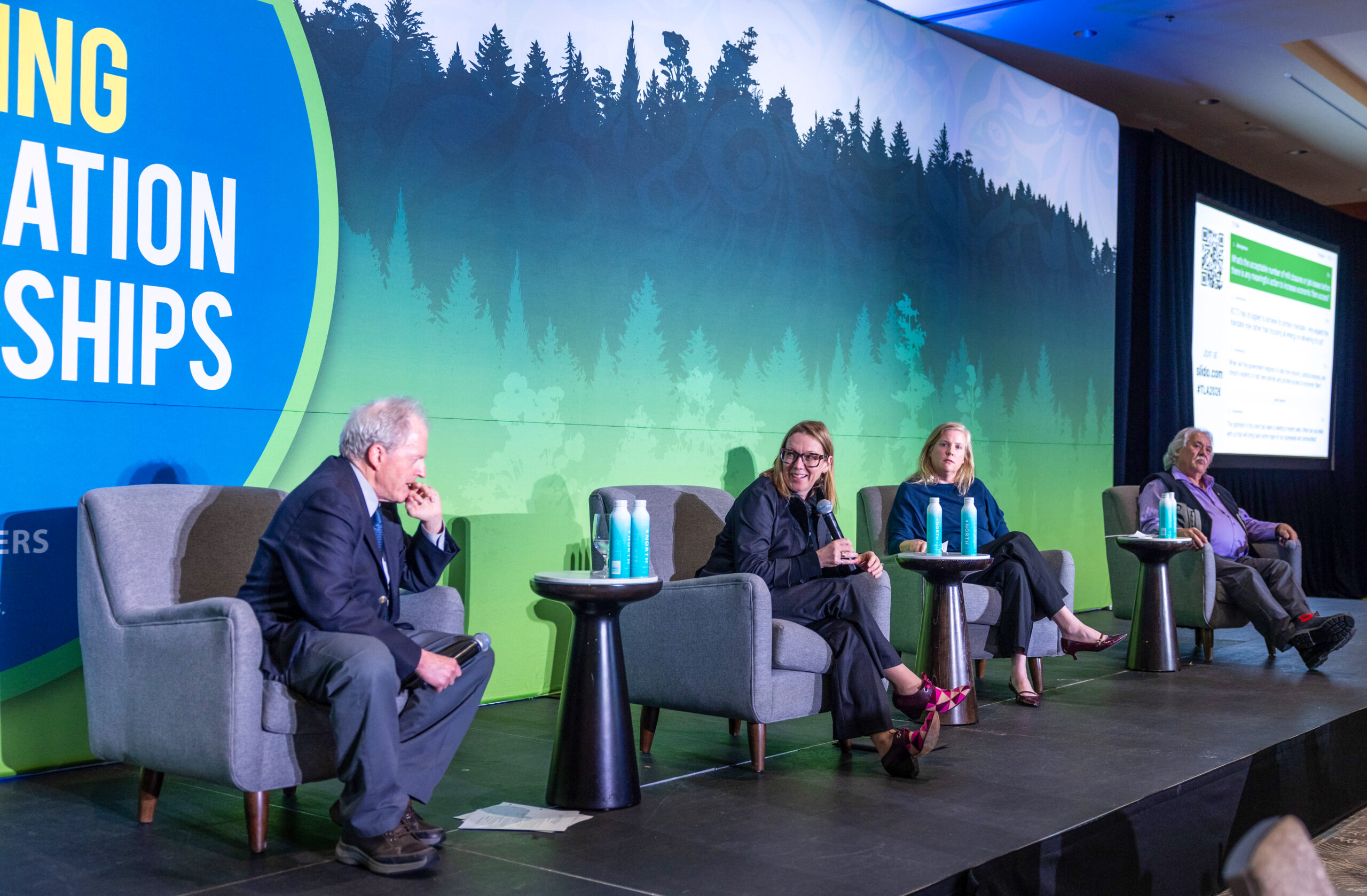 Day 1 of the TLA Conference continued with the Government Initiatives Update panel, offering a detailed look at current policy work within the BC Ministry of Forests, reforms at BC Timber Sales, and longer-term system challenges. Moderated by Vaughn Palmer, the session featured Makenzie Leine, Deputy Minister of Forests; Melissa Sanderson, Assistant Deputy Minister; and Garry Merkel, Co-Chair of the Provincial Forestry Advisory Council. Leine outlined the ministry’s priorities, including tariff response, the Path to 45 initiative, and a shift toward management-unit-level problem-solving rather than broad, one-size-fits-all policy. Sanderson provided an update on the BCTS review, its expanded public-interest mandate, and early implementation steps, including Category 4 value-added supply, stewardship work, and measures affecting contractors. Merkel addressed longer-term structural issues, questioning why repeated reviews have failed to deliver lasting stability and calling for governance approaches that better align economic activity, communities, and forest stewardship.
Day 1 of the TLA Conference continued with the Government Initiatives Update panel, offering a detailed look at current policy work within the BC Ministry of Forests, reforms at BC Timber Sales, and longer-term system challenges. Moderated by Vaughn Palmer, the session featured Makenzie Leine, Deputy Minister of Forests; Melissa Sanderson, Assistant Deputy Minister; and Garry Merkel, Co-Chair of the Provincial Forestry Advisory Council. Leine outlined the ministry’s priorities, including tariff response, the Path to 45 initiative, and a shift toward management-unit-level problem-solving rather than broad, one-size-fits-all policy. Sanderson provided an update on the BCTS review, its expanded public-interest mandate, and early implementation steps, including Category 4 value-added supply, stewardship work, and measures affecting contractors. Merkel addressed longer-term structural issues, questioning why repeated reviews have failed to deliver lasting stability and calling for governance approaches that better align economic activity, communities, and forest stewardship.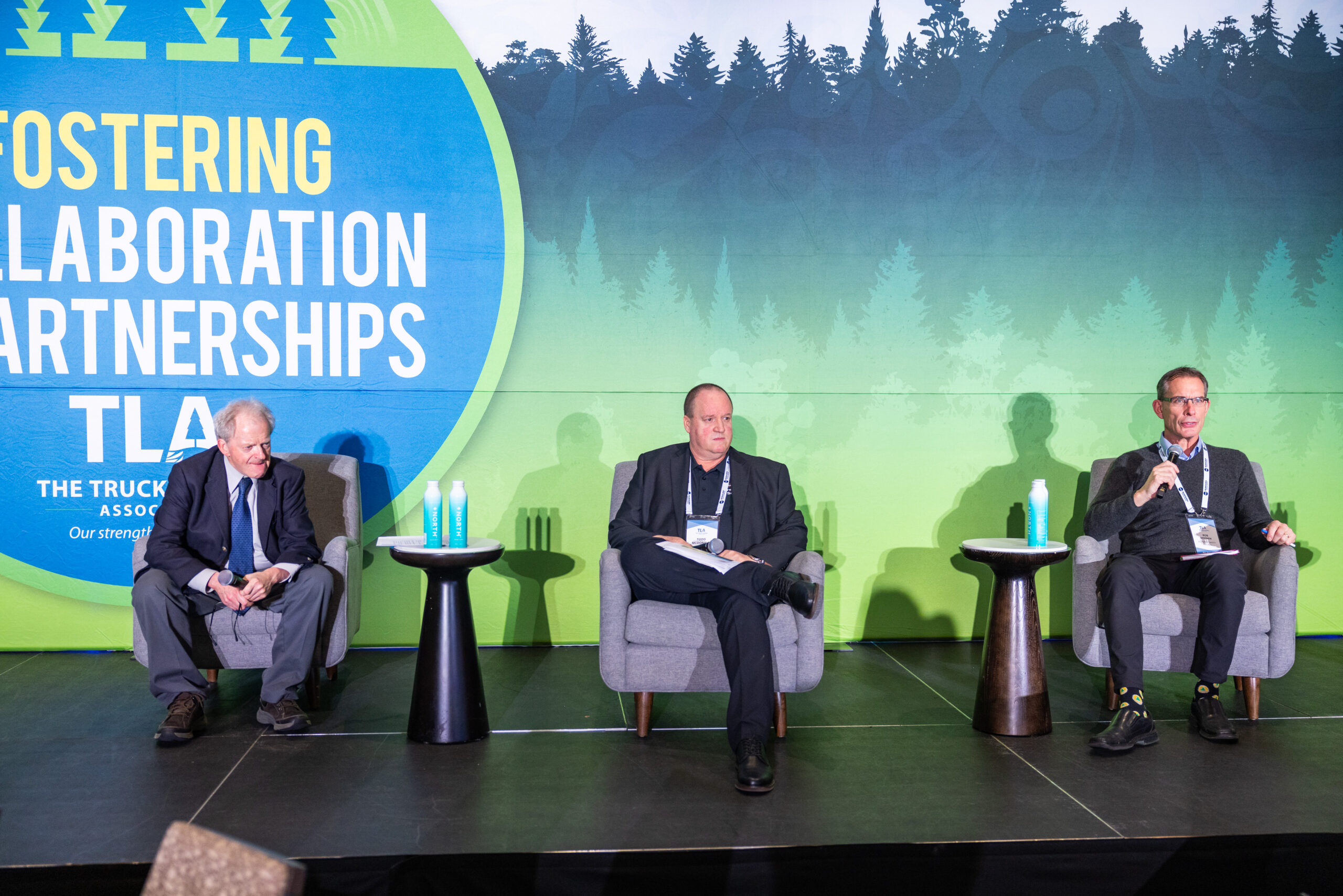 Day 1 of the TLA Conference concluded with the Improving Workplace Safety panel, examining how industry and regulators are addressing risk during a period of economic pressure and operational uncertainty. Moderated by Vaughn Palmer, the session featured Rob Moonen, CEO of the BC Forest Safety Council, and Todd McDonald, Head of Prevention Services at WorkSafeBC. Moonen, who noted he will retire at the end of March, warned that cost pressures and tighter margins are creating conditions that can undermine safety, stressing that the industry “cannot afford to wait for another crisis before acting.” He highlighted mental health as a growing concern and outlined the Council’s new Connection to Care counselling initiative. McDonald described WorkSafeBC’s prevention approach, emphasizing education and consultation alongside enforcement, and identified key risk areas including extreme weather, motor-vehicle incidents, ergonomics, and mental health. Both speakers underscored that sustained leadership and collaboration remain essential to protecting forestry workers.
Day 1 of the TLA Conference concluded with the Improving Workplace Safety panel, examining how industry and regulators are addressing risk during a period of economic pressure and operational uncertainty. Moderated by Vaughn Palmer, the session featured Rob Moonen, CEO of the BC Forest Safety Council, and Todd McDonald, Head of Prevention Services at WorkSafeBC. Moonen, who noted he will retire at the end of March, warned that cost pressures and tighter margins are creating conditions that can undermine safety, stressing that the industry “cannot afford to wait for another crisis before acting.” He highlighted mental health as a growing concern and outlined the Council’s new Connection to Care counselling initiative. McDonald described WorkSafeBC’s prevention approach, emphasizing education and consultation alongside enforcement, and identified key risk areas including extreme weather, motor-vehicle incidents, ergonomics, and mental health. Both speakers underscored that sustained leadership and collaboration remain essential to protecting forestry workers.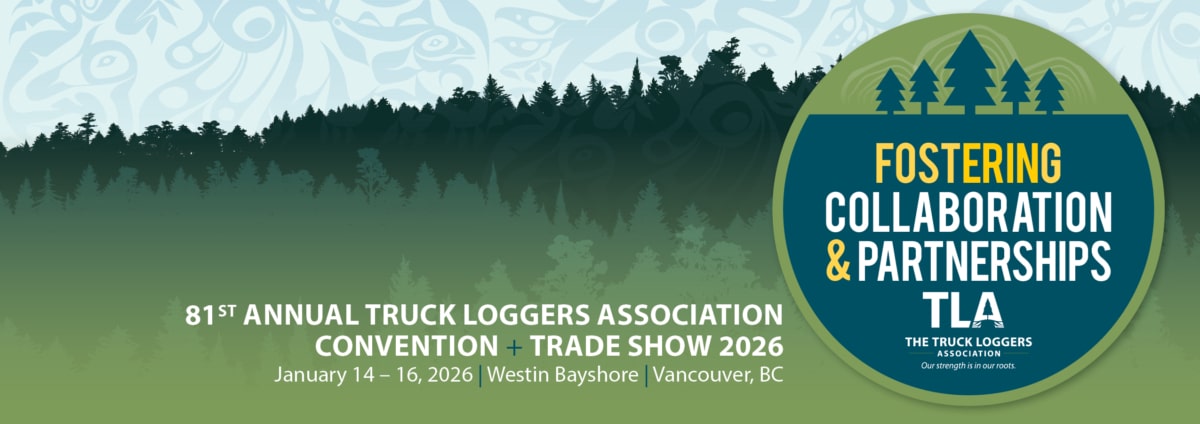
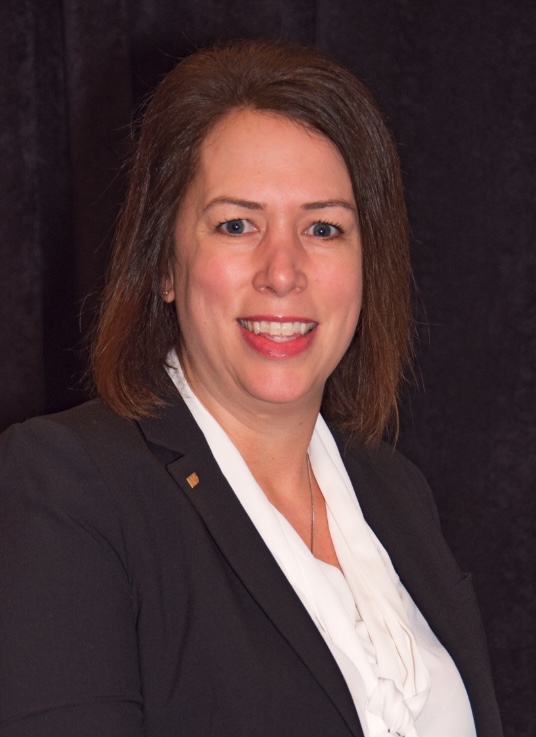
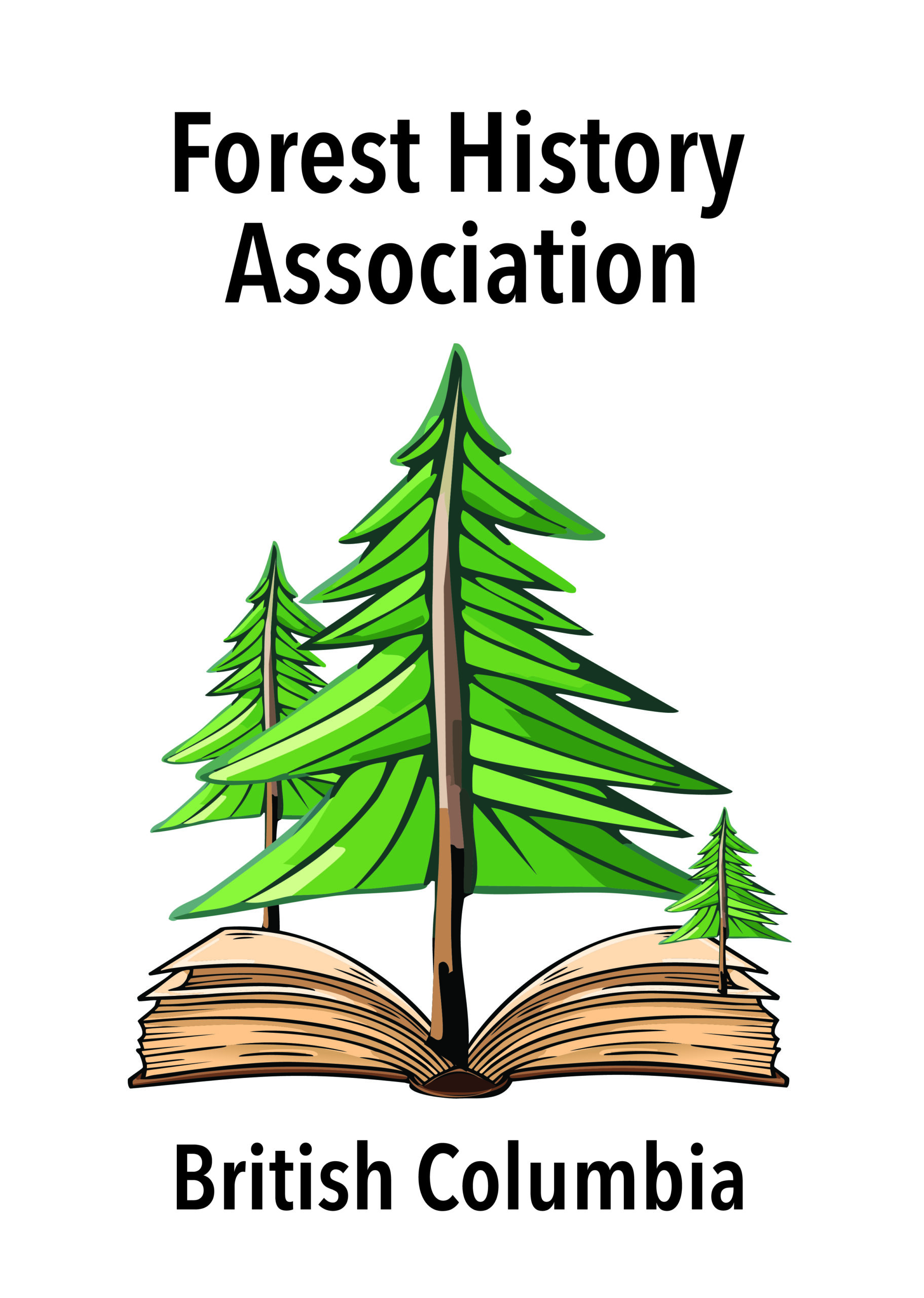

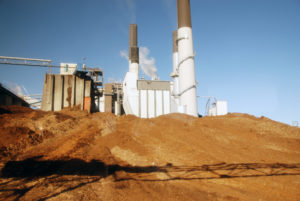 When the City of Nanaimo tabled a zoning amendment to Bylaw 4500 that could effectively change the heavy industry zoning in Nanaimo on Nov. 17, there was one main target: Nanaimo Forest Products. NFP owns Harmac Pacific, ‘the little pulp mill that did,’ which continues to pay around 350 full-time employee-owners while maintaining consistent profitability, and is a major Vancouver Island success story. They’ve done that thanks to an employee ownership model that sees workers share in its profits, as well as clever leadership which has made several key investments. …One of NFP’s key strategic moves was purchasing the 61 hectares adjacent to Harmac, which is industrial land. Developing that will benefit NFP and its worker-shareholders, companies that want to set up business in Nanaimo with ocean access, Harmac employees and taxpayers.
When the City of Nanaimo tabled a zoning amendment to Bylaw 4500 that could effectively change the heavy industry zoning in Nanaimo on Nov. 17, there was one main target: Nanaimo Forest Products. NFP owns Harmac Pacific, ‘the little pulp mill that did,’ which continues to pay around 350 full-time employee-owners while maintaining consistent profitability, and is a major Vancouver Island success story. They’ve done that thanks to an employee ownership model that sees workers share in its profits, as well as clever leadership which has made several key investments. …One of NFP’s key strategic moves was purchasing the 61 hectares adjacent to Harmac, which is industrial land. Developing that will benefit NFP and its worker-shareholders, companies that want to set up business in Nanaimo with ocean access, Harmac employees and taxpayers.
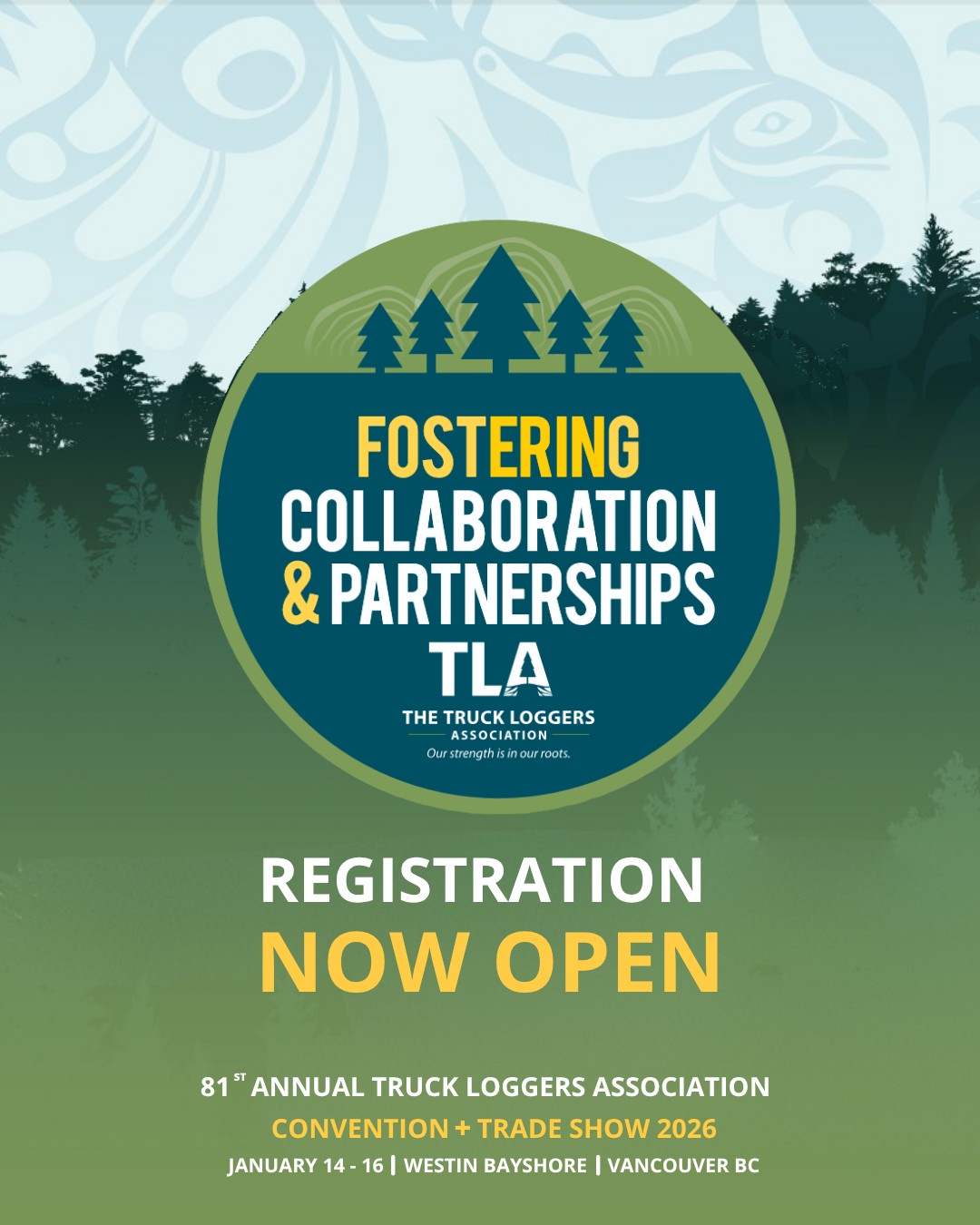 For more than 80 years, the annual
For more than 80 years, the annual 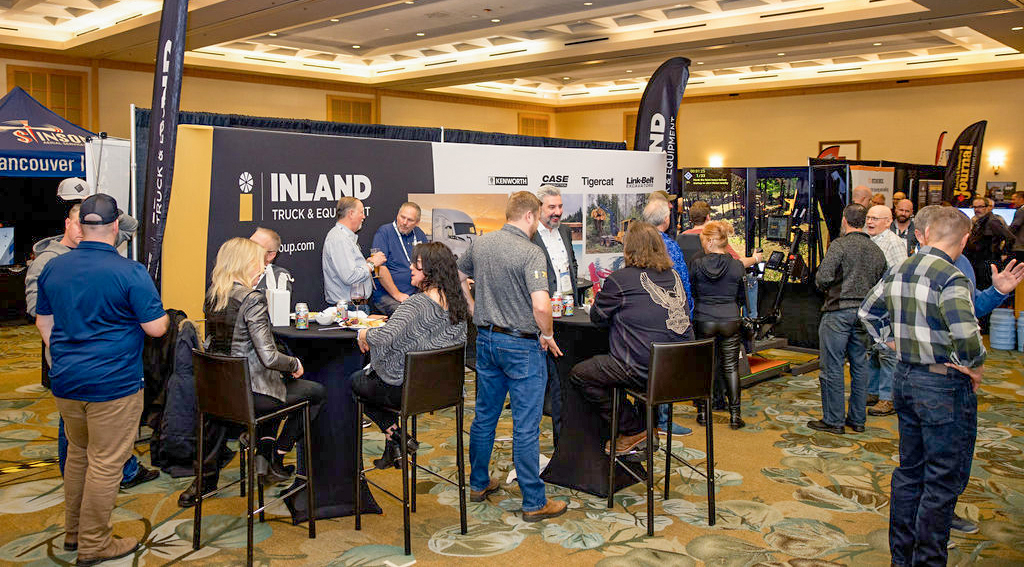 Sponsors enjoy high-profile recognition before, during, and after the convention, ensuring your brand stays top of mind among key industry players. Tracey Russell, Vice President-Equipment, Inland Truck & Equipment Ltd. is a regular at the Convention, “We sponsor the TLA Convention + Trade Show every year because it’s one of the best opportunities for exposure and relationship building – connections that have made a lasting impact on our business and our brand.”
Sponsors enjoy high-profile recognition before, during, and after the convention, ensuring your brand stays top of mind among key industry players. Tracey Russell, Vice President-Equipment, Inland Truck & Equipment Ltd. is a regular at the Convention, “We sponsor the TLA Convention + Trade Show every year because it’s one of the best opportunities for exposure and relationship building – connections that have made a lasting impact on our business and our brand.”
 BC Wood’s 22nd Annual Global Buyers Mission (GBM) opened in Whistler, BC on Friday morning, with Premier David Eby declaring the tradeshow floor open and underscoring the value-added sector’s critical role in British Columbia’s economy and its importance to international markets. …Nearly 600 participants attended this year’s gathering, including specifiers, government representatives, and international buyers from across Asia and beyond. BC Wood CEO Brian Hawrysh welcomed the attendees… and Board chairperson Kelly Marciniw of Zirnhelt Timber Frames, introduced the
BC Wood’s 22nd Annual Global Buyers Mission (GBM) opened in Whistler, BC on Friday morning, with Premier David Eby declaring the tradeshow floor open and underscoring the value-added sector’s critical role in British Columbia’s economy and its importance to international markets. …Nearly 600 participants attended this year’s gathering, including specifiers, government representatives, and international buyers from across Asia and beyond. BC Wood CEO Brian Hawrysh welcomed the attendees… and Board chairperson Kelly Marciniw of Zirnhelt Timber Frames, introduced the 
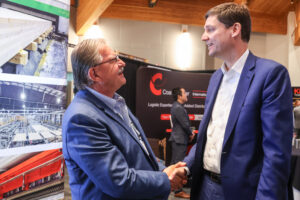

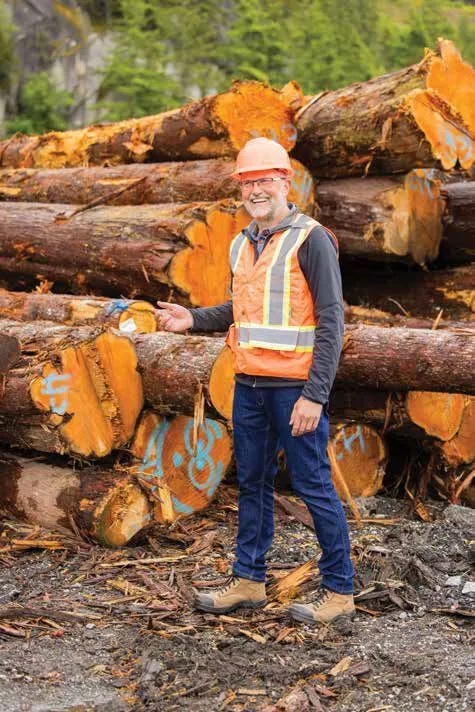
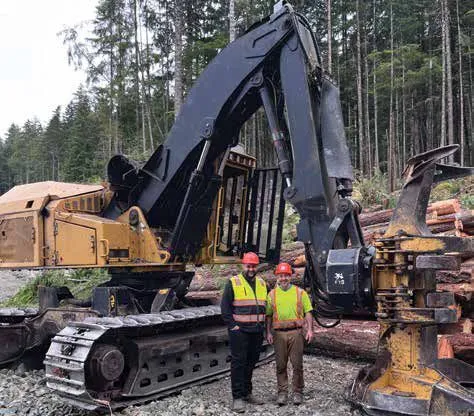
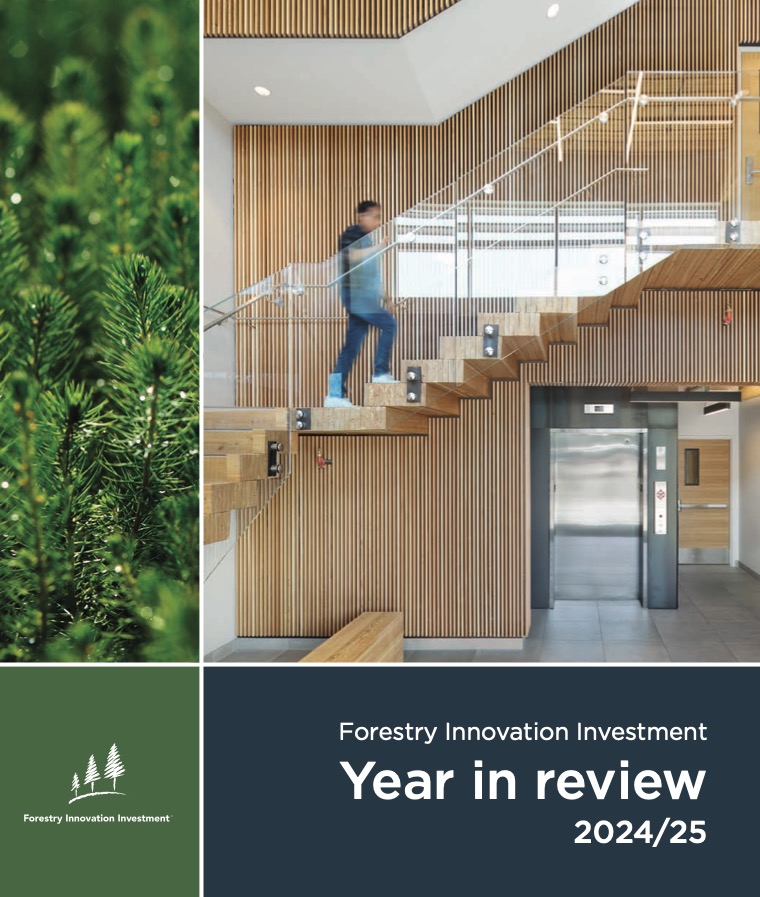 Forestry Innovation Investment (FII) is proud to share our “Year in Review”, a compilation of market development activities completed by FII and our many industry, association, government, academic, and research partners over the past year. Throughout 2024/25, B.C.’s forest sector faced significant headwinds, as difficult industry and market dynamics were compounded by trade threats. Despite these ongoing challenges, the forest sector continues to play a vital role in B.C.’s economy and remains a key global supplier of sustainable forest products and advanced wood building systems. To support a resilient forest economy, FII and its partners are actively working to diversify markets for B.C. forest products both domestically and internationally—a goal that has become increasingly important amid current trade uncertainty. Our commitment to a collaborative delivery approach means we build on the strengths and shared resources that other organizations bring to this important work.
Forestry Innovation Investment (FII) is proud to share our “Year in Review”, a compilation of market development activities completed by FII and our many industry, association, government, academic, and research partners over the past year. Throughout 2024/25, B.C.’s forest sector faced significant headwinds, as difficult industry and market dynamics were compounded by trade threats. Despite these ongoing challenges, the forest sector continues to play a vital role in B.C.’s economy and remains a key global supplier of sustainable forest products and advanced wood building systems. To support a resilient forest economy, FII and its partners are actively working to diversify markets for B.C. forest products both domestically and internationally—a goal that has become increasingly important amid current trade uncertainty. Our commitment to a collaborative delivery approach means we build on the strengths and shared resources that other organizations bring to this important work.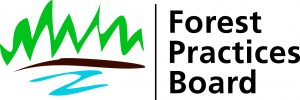 A
A  With roughly 2,000 wildfires in B.C. each year, forestry workers are often operating in or near fire-affected areas. It’s up to employers to ensure their crews are properly trained and prepared to recognize the risks and respond safely. …Employers are responsible for identifying hazards, assessing risks, and ensuring effective controls are in place — along with providing training, supervision, and fit-for-use equipment.
With roughly 2,000 wildfires in B.C. each year, forestry workers are often operating in or near fire-affected areas. It’s up to employers to ensure their crews are properly trained and prepared to recognize the risks and respond safely. …Employers are responsible for identifying hazards, assessing risks, and ensuring effective controls are in place — along with providing training, supervision, and fit-for-use equipment.